- Meet the Team
- Our Manifesto
- Work with Us
- Budget Travel
- Personal Development
- Work & Travel
- United Kingdom
- More of Europe
- Philippines
- More of Southeast Asia
- More of South America
- More of Central America
- South Korea
- More of Asia
- More of North America
- New Zealand
- Pacific Islands
- More of Oceania
- South Africa
- More of Africa
- More of the Middle East
- Travel Essentials
- Travel Gear
Home » Southeast Asia » Travel Safety

Is Cambodia SAFE to Visit? (2024 • Insider Tips)
Cambodia is firmly on the backpacking route through Southeast Asia, thanks in part to superlative attractions like Angkor Wat, Ko Rong, and the pink dolphins of the Mekong. It’s also popular because most visits are trouble-free.
But theft is definitely an issue, and some nasty robberies do happen. The country is also known for drug trafficking.
So… is Cambodia safe to visit ?
It’s a genuine worry – we get it – especially if you’re a first-time backpacker.
To help out, we’ve created this insider’s guide full of information and tips on how to stay safe in Cambodia. Because this is a truly epic country that’s absolutely worth exploring.
So let’s dive into one of Southeast Asia’s most underrated destinations.
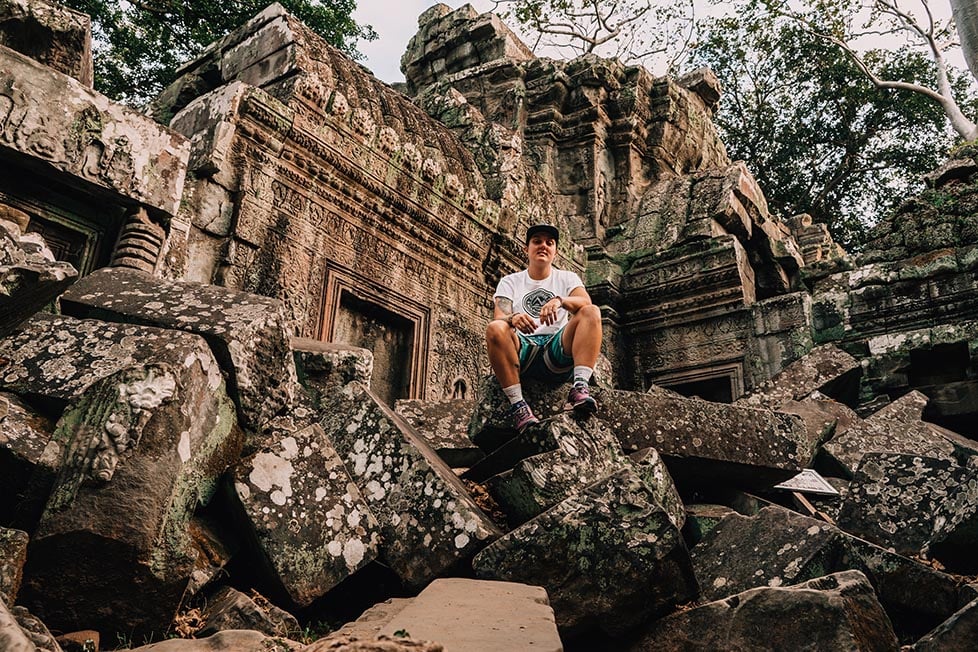
The Broke Backpacker is supported by you . Clicking through our links may earn us a small affiliate commission, and that's what allows us to keep producing free content 🙂 Learn more .
There is no such thing as a perfect safety guide, as things change quickly. The question of “Is Cambodia Safe?” will ALWAYS have a different answer depending on who you ask.
The information in this safety guide was accurate at the time of writing. If you use our guide, do your own research, and practice common sense, you will probably have a wonderful and safe trip to Cambodia.
If you see any outdated information, we would really appreciate it if you could reach out in the comments below. Otherwise, stay safe friends!
Updated December 2023
Is Cambodia Safe to Visit Right Now?
Safest places in cambodia, 20 top safety tips for traveling to cambodia, is cambodia safe to travel alone, is cambodia safe for solo female travelers, where to start your travels in cambodia, is cambodia safe for families, getting around cambodia safely, crime in cambodia, what to pack for your cambodia trip, getting insured before visiting cambodia, faqs on safety in cambodia , so, is cambodia safe.
- Buy Us a Coffee!
As stated in Cambodia’s Tourism Statistics report , 2,276,626 international tourist arrived in the country on 2022. Most of these travellers had a generally safe stay.
Cambodia is absolutely safe to visit right now, mostly due to the increased emphasis on tourism. The Cambodian economy is strongly reliant on visiting foreigners, who pour millions into the country. Tourist visas are can be obtained on arrival for most nationalities,
Unfortunately, many people live close to or below the poverty rate, which can be very clear to see as you travel around Cambodia. Corporate and governmental corruption doesn’t help this situation either.
Instances of petty crime do exist as well. Pickpocketing and snatching bags do happen.
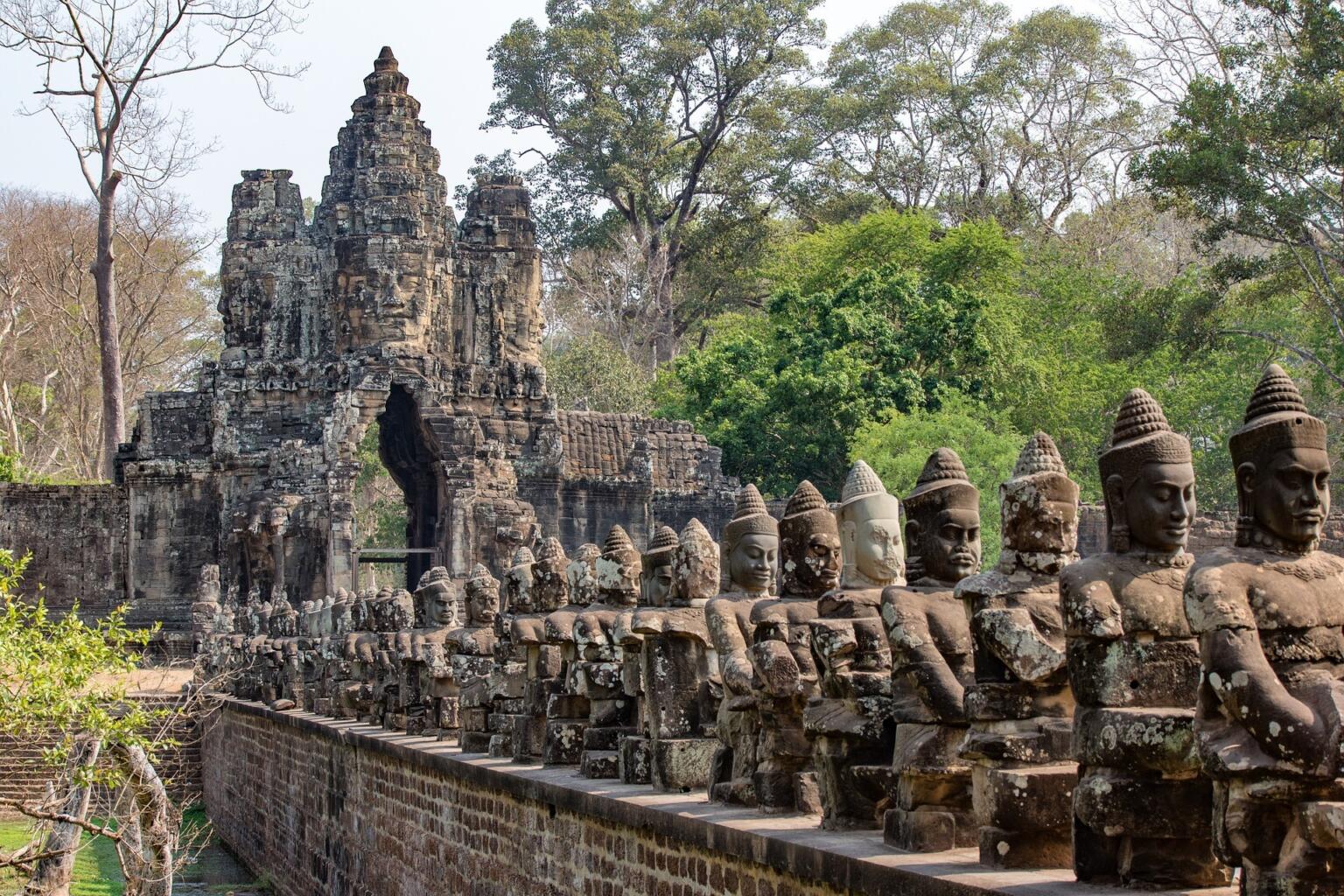
More serious violent crime tends to grab headlines but doesn’t make up the common experience of travelers in Cambodia at all. In fact, a lot of victims of violent crime are Cambodians themselves.
Politically, Cambodia is pretty much stable. This is down to a tough government stance on opposition parties and “illegal” protests. The most recent election passed without too much trouble and currently, there’s nothing to worry about.
When you visit Cambodia plays also into how safe it’s going to be for you, too. The Mekong River can flood in the rainy season (June-October). Landslides aren’t uncommon and poor drainage, even in the capital Phnom Penh , leads to pretty severe flooding during a storm.
Landmines and unexploded ordnance are always an imminent threat. Many haven’t been cleared even to this day. So no wandering too far off the beaten track, unfortunately…
With all of this in mind, it’s still very safe for tourists to visit Cambodia right now, and this is especially true for tourist hotspots like Siem Reap and the islands. Most visits don’t see any trouble, and you’ll be perfectly fine as well if you’re cautious and use your travel common sense.
Check out our detailed where to stay guide for Cambodia so you can start your trip right!
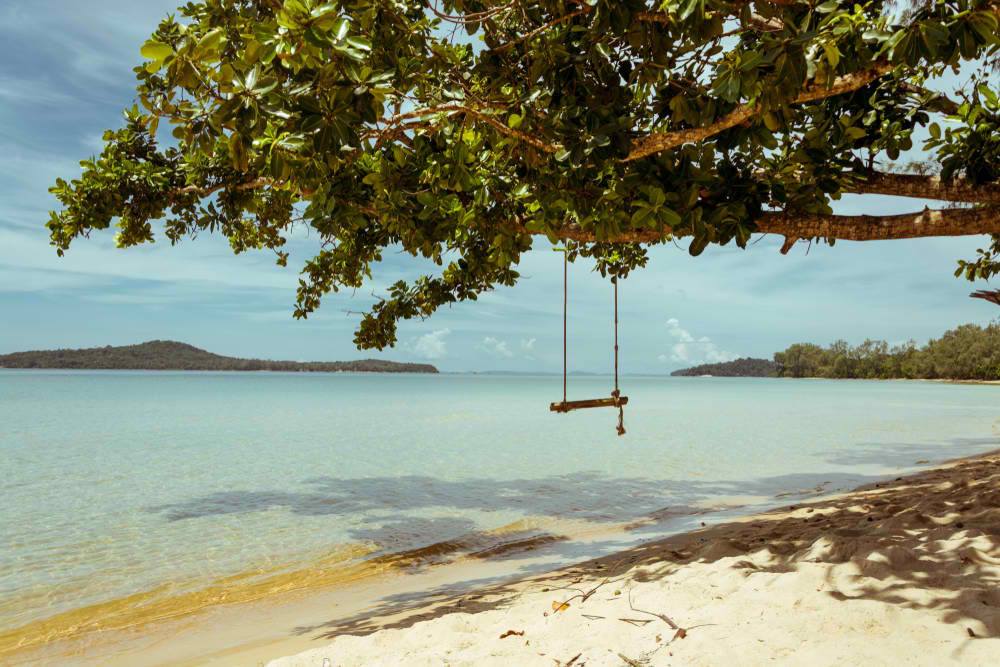
When choosing where you’ll be staying in Cambodia, a bit of research and caution are essential. You don’t want to end up in a sketchy area and ruin your trip. To help you out, we’ve listed the safest areas to visit in Cambodia below.
- Koh Rong: Koh Rong is an island in the south of Cambodia, off the coast of the Sihanoukville area. It’s actually the second-largest island in all of Cambodia. This beautiful island is known for its bewitching coral reefs and for plentiful wildlife peeking out through the branches in the dense jungle terrain.
- Kampot : Kampot is one of the most unique cities in Cambodia, and it’s also one of my best destinations in Southeast Asia in its entirety. It’s a darling town, quite small in size, that offers guests incredible nature-based experiences. So much of Kampot feels untouched. It’s a blissful place to stay.
- Kep : Kep is a small seaside town in the south of Cambodia, and is the sister city to Kampot. They’re just over 20 miles apart, and it takes about 45 minutes to get there by scooter. It’s sleepy, however, and not a place for party-goers, as the entire town of Kep feels a little drowsy.
- Siem Reap : Attracting millions of visitors tourists every year to its iconic Angkor Wat, Siem Reap is no doubt one of the safest and easiest places to travel in all of Cambodia.
Places to Avoid in Cambodia
Even though Cambodia has somewhat of a reputation for being unsafe, the following places are still VERY safe compared to most countries’ places to avoid list.
- Areas along the Northwest border with Thailand – that’s where most hidden landmines can be found
- Sihanoukville : A now overly-developed mess of Chinese-built casinos and hotels, this city is seedy and polluted. Minimize your time here when heading to the islands due to higher levels of crime.
- Phnom Penh’s riverside at night : While it’s perfectly fine to stroll along the Mekong during the day, even local kids will warn you to avoid the riverwalk after dark.
Keeping Your Money Safe in Cambodia
One of the most common things to happen to you whilst travelling is losing your money. And let’s face it: the most annoying way for this to actually occur is when it’s stolen from you.
Petty crime is pretty much a problem all over the world.
The best solution? Get a money belt.
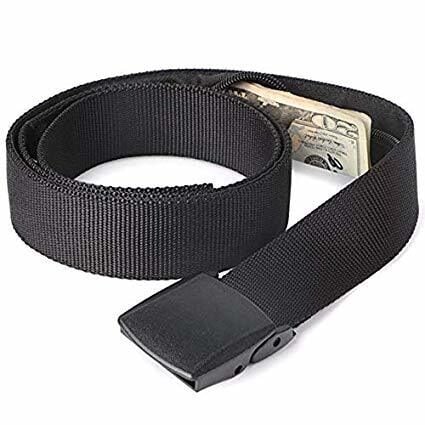
Stash your cash safely with this money belt. It will keep your valuables safely concealed, no matter where you go.
It looks exactly like a normal belt except for a SECRET interior pocket perfectly designed to hide a wad of cash, a passport photocopy or anything else you may wish to hide. Never get caught with your pants down again! (Unless you want to…)
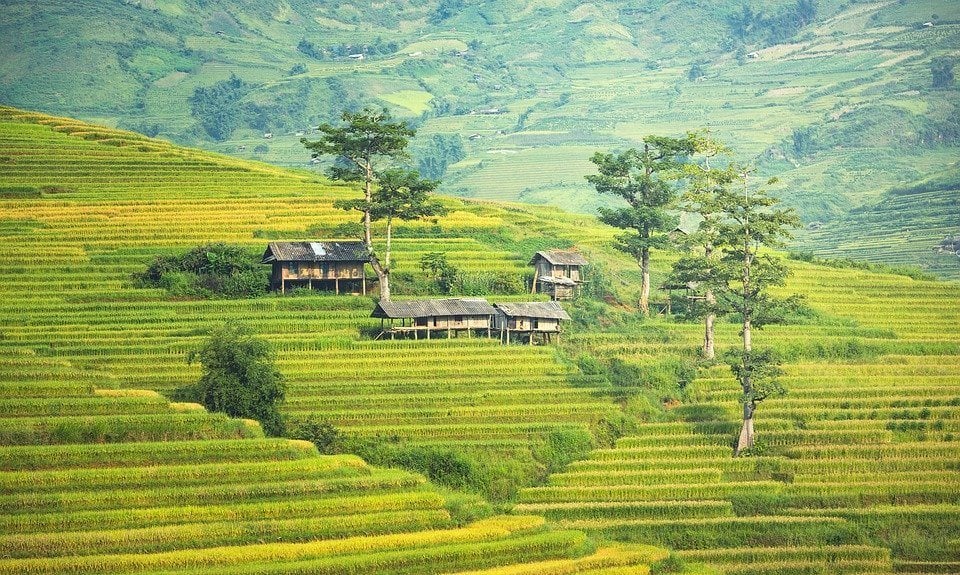
Cambodia isn’t super dangerous , but it’s also not the best place in the world when it comes to personal safety. Tourists can be seen as easy targets because they’re (always) comparatively rich. Even backpackers can seem like kings.
However, that doesn’t mean you can’t travel around Cambodia safely – not at all. To make sure you stay safe, we’ve got a few travel safety tips to help you on your way.
- Keep belongings close to you in tourist areas – this is where petty theft is likely to occur. Motorbike thieves exist also, so be aware.
- Don’t walk around looking like a tourist – designer clothes, SLRs, wearing expensive jewellery all screams “I’M RICH”. An advert for thieves.
- Be careful of pickpockets – especially walking around crowded streets and tourist areas. Consider investing in a travel money belt for ultimate protection.
- Dress appropriately – it’s not ultra-conservative at all, but in temples, you need to be covering your shoulders and knees.
- Be vigilant in the run-up to festivals – robberies increase as people get desperate for money. Take care.
- Walking around with a smartphone isn’t advised – you’ll probably be ok, but still… Smartphones are expensive.
- Watch out for over-friendly strangers – Cambodians are friendly. But if something seems weird, and the friendliness is too much, then they may not have the best intentions. Scams DO happen.
- Be careful with recreational drugs – Cannabis is cool and, but yaba is a different story . A horrible drug to get involved with.
- On the subject… – drugs mean you’ll have to deal with sketchy individuals and the police will ask for bribes if they catch you. You may even get set up.
- Kids of the Cambodian elite carry a lot of sway – and some carry guns. If you’re out at night, don’t get into any scuffles.
- Be wary of other travelers and expats – the lawless reputation of Cambodia attracts some shady characters. Be careful who you get involved with.
- Keep all important things WITH you on a bus – this is the best way to prevent ANYONE getting to ’em.
- Always keep an emergency stash of cash – Never keep all your cards/ currency in one place. And hide it all from thieves with a hidden money belt .
- Children will come up to you – it’s your choice if you give them money, but there are loads of NGOs that you could help out instead. It’s a good idea to read up on the impacts of tourists enabling beggars .
- Don’t lose your temper – causing a scene in Cambodia is likely to CAUSE A SCENE. Don’t let a situation get heated.
- Be careful where you take photos – military installations, airports=not ok. It’s also important to ask before you take pictures of ANYBODY.
- Walking alone at night in rural areas isn’t advised – increased risk of robbery.
- Fake monks – they’ll get you to pay money if you wander into a temple on the outskirts of Angkor Wat. Don’t bother.
- Protect against mosquitoes – cover up, use repellent, burn coils. Not nice to get bitten.
- Take a good medical kit with you – you never know when you might need it!
- Watch out for dangerous wildlife – snakes are definitely present. When walking around rural areas keep your eyes peeled.
- Have travel insurance – Medical facilities in Cambodia aren’t the best, so be sure to have insurance that covers medical evacuation.
- Know what to do in the event of natural disasters .
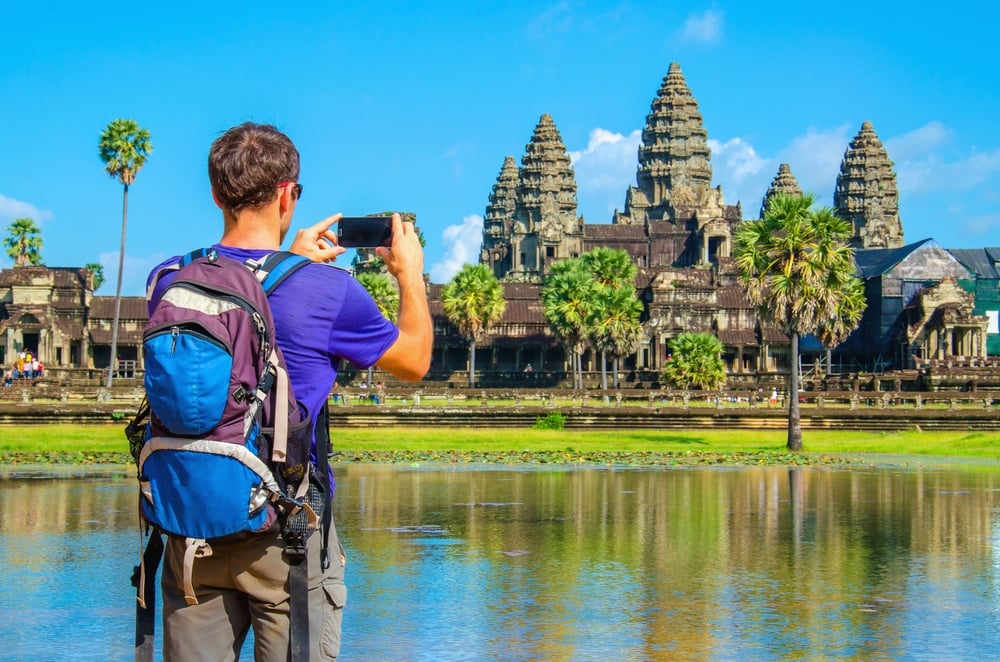
If you’re thinking about solo travel in Cambodia and you’ve never done it before, well all we can say is you’re in for a treat. There are plenty of reasons why solo travel is pretty much amazing. Mainly: It’s YOUR trip and YOUR trip only!
BUT it is a challenge, of course, and there are always things to keep in mind when you’re solo traveling anywhere in the world. So even though traveling alone to Cambodia is relatively safe, here are a couple of notes to keep in mind when you’re out there.
- We’d recommend staying in awesome hostels in Cambodia where you can meet other backpackers . It’s not only cool to meet people who are doing the same thing as you, but it’s also a good way to beat the solo traveling blues (it CAN get lonely sometimes).
- When you’re looking for a social hostel , make sure you find one with good reviews. You’ll be amazed at the prices in Cambodia, but don’t automatically go looking for the cheapest accommodation possible.
- Knowing a few new people is always great for sharing tours. This is handy, for example, when you want to see Angkor Wat or do a day tour of Phnom Penh or something.
- Don’t go getting crazy drunk, even on Pub Street. Things can be more sketchy at night too, which is when you’ll be walking home.
- Save important phone numbers – know who to call if you needed emergency consular assistance.
- Be careful at the beach after dark. Beaches are secluded areas and robberies, especially in Sihanoukville, have been reported.
- And whilst we’re on the subject, don’t drink and swim. It’s stupid.
- We’d recommend leaving your stuff in your guesthouse. Don’t take your valuables with you when you go out for the day. Leave it locked up in the safe if there is one.
- Get yourself a data sim to travel with . This is a good way to keep in touch with people you meet on your trip. It’s also a good way to let your parents and your friends back home know you’re still safe .
- Speaking of which, get yourself Maps.me. Google Maps may work offline, but not always. Maps.me is a reliable, offline maps app that’ll help you pinpoint where you are in case you find yourself lost in the city.
- Learn some Khmer. It’s not the easiest language, but it’s not tonal. Simple phrases will go a long way in impressing locals and building up relationships.
- Don’t get temple burnout! Also known as “temple blindness” or “temple boredom”. There is a whole load of temples to see in Cambodia, so we’d recommend doing research on the best, most fascinating, historically relevant temples or the ones that will interest you the most.
At the end of the day, YOU are the only one looking out for yourself. So being responsible and keeping your wits about you is going to go a long way.
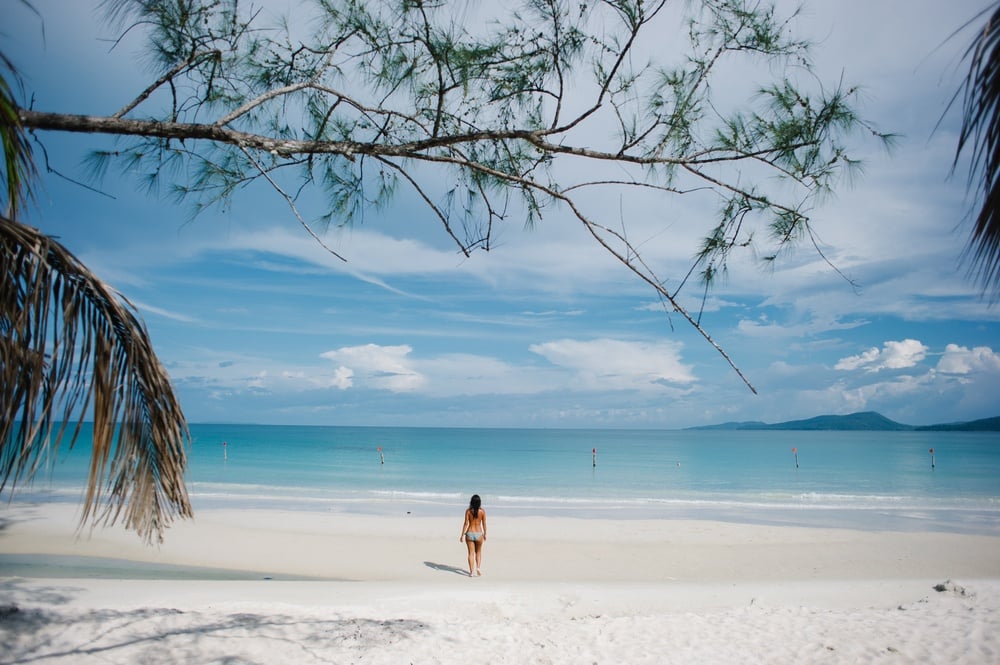
There’s solo travel, then there’s solo female travel . And unfortunately, being a woman makes the world a whole lot more unsafe. However, we’re happy to say that Cambodia is a GREAT place for a solo female traveler.
With its laid-back, easygoing atmosphere, we’d even go as far as to say it’s a good destination even for a first-timer.
The sad thing is, as a woman you’re often more at risk, no matter where you are. Just to be sure, here are a few ways you can maximize your experiences as a solo female traveler in Cambodia.
- Make friends with other female travelers, especially if it’s your first time solo traveling. Not only do you get to meet some nice, like-minded people, but you’ll also get some extra backpacking tips .
- Keep up with local media – be aware of what’s going on on the ground!
- And the best way to get chatting with fellow travelers is by staying in a well-reviewed hostel. With a female-only dorm, if you want.
- Cambodia’s a pretty conservative country so covering up is respectful. This is important mainly at temples , but wearing clothes that consistently cover your knees and shoulders just feels a lot more fitting. Look at what the local women are wearing – especially in more remote areas.
- Don’t touch monks! No, seriously. They’re not allowed contact with women and they’ll have to go through all sorts of rituals if you touch them.
- If you’re wandering around at night it’s relatively safe BUT stick to busy, well-lit areas. Would you wander down quiet, dark backstreets at home?
- Be extra vigilant if you’re traveling alone at night by motorbike or bicycle.
- Drink spiking has been on the rise lately so be careful. Only drink the drinks you buy for yourself.
- BE CAUTIOUS in beach areas of Sihanoukville. This town has become a lot shadier in recent years and beaches at night time here are not the place to be by yourself.
- Use your common sense. If a situation is getting weird, if someone seems sketchy, remove yourself or don’t get involved at all. Find somewhere busy.
- You may be seen as an easy target for bag snatching, so keep things like that close to you. This has been reported as happening as women are riding in a tuk-tuk, so be extra careful in that sort of situation.
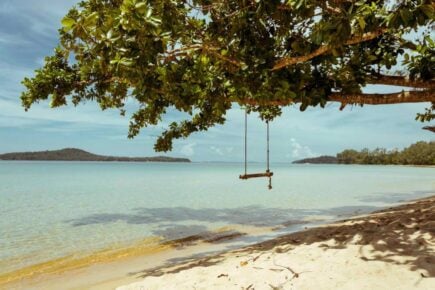
From waterfalls, endless white-sand beaches, beautiful nature, and some of the friendliest locals, Koh Rong is the ultimate getaway in Cambodia. You’ll make some unforgettable memories here, that’s for sure!
Cambodia is a great place to travel with kids !
There are ancient temples here that your kids will freak out about. They’re like something straight out of a film or a video game. Sometimes they actually are from fiction!
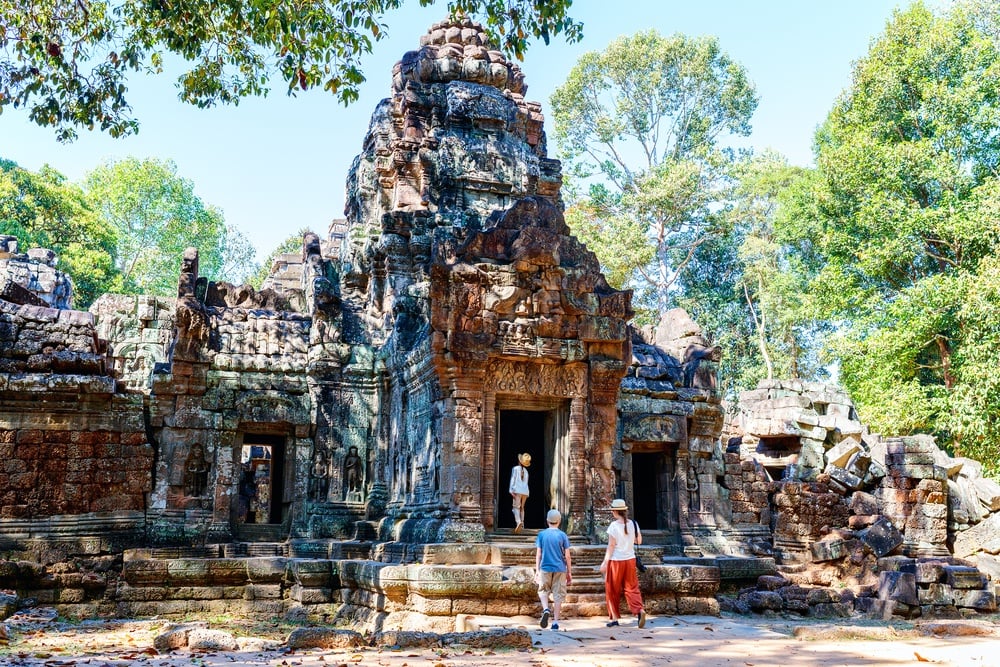
And sights aside, Khmer people are very friendly, especially to children. This will make a big difference and will make it pretty easy for your kids to find local playmates.
But obviously, there are some things you need to bear in mind:
- One of these is long journeys on unreliable buses. Safety often isn’t the priority on a bus; driving fast and not putting on the air-con is the norm.
- Cambodia can get HOT. Make sure everyone stays hydrated and keeps out of the sun. Bring plenty of reusable water bottles.
- Animal hazards include sandflies on the beaches (these can be BRUTAL) as well as snakes. Very dangerous.
- It’s also not always the cleanest of places, the infrastructure is sometimes lacking, and the healthcare isn’t amazing…
So whilst Cambodia is safe to travel for children, it’s better if you’re an adventurous family.
We wouldn’t call driving “safe” in Cambodia.
Why? Road accidents are the leading cause of death in Cambodia.
You may be tempted to hire your own car to avoid those sometimes very pirate-like minibuses, but it’s really not worth it. International driving permits are a ballache and while motorbiking is more common, the roads are absolutely hectic to say the least.
If you’ve never been on a motorbike before, Cambodia is definitely not the right place to start.
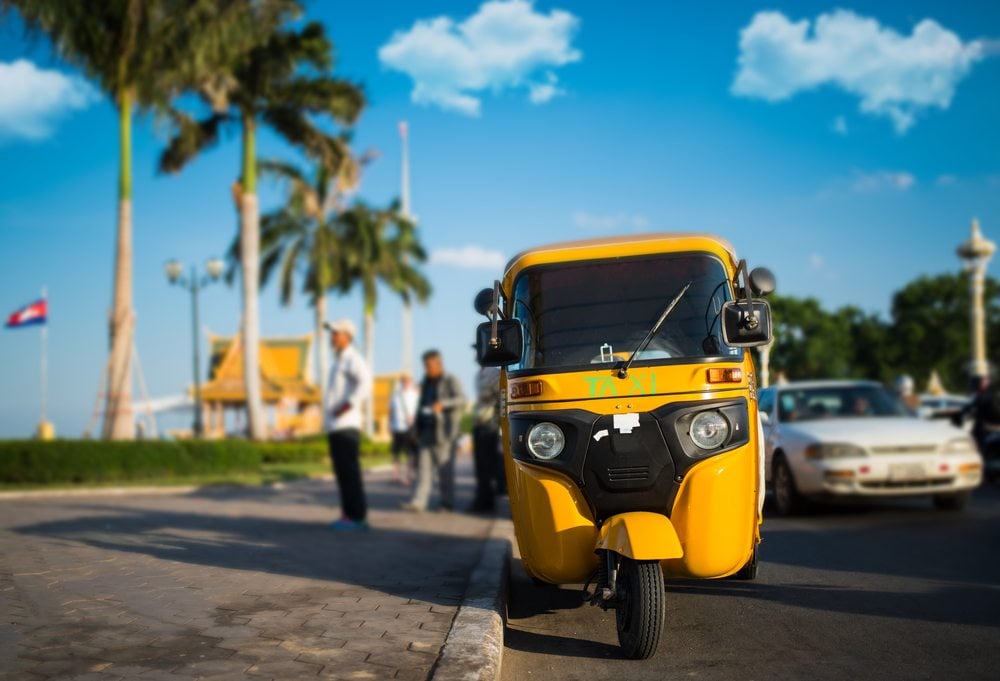
Really, in Cambodia, it’s all about tuk-tuks. They are used all across the country and are safe.
You’ll be hassled in pretty much every town with “tuk-tuk?” as you pass an idling driver. They’re usually friendly enough and will leave you alone the instant you decline.
But if you do get a tuk-tuk off the street haggle the price before you get in.
Honestly, there isn’t much public transport in Cambodia. The stuff that does exist is mainly safe though.
The minibusses drive fast and recklessly and aren’t always in the best condition either.
That said, large air-conned buses do exist and these travel between large cities – the route between Phnom Penh and Siem Reap for instance. This is about as public as it gets.
Petty crime is by far the biggest issue tourists will face in the country. That doesn’t mean you’re guaranteed to experience it though–many do not. Police corruption is also rife–bribes are very much a thing, though you might only encounter this when crossing a land border. Meanwhile, drug trafficking is another major issue in the country, but not one that’s likely to affect tourists.
Finding marijuana and other party drugs is very easy within backpacker enclaves. Both Siem Reap and Phnom Penh are known for their “ happy pizza restaurants ” that serve cannabis-infused pies and smoothies.
Just be aware that according to local laws, cannabis is illegal and thus should not be smoked in public.
Scams in Cambodia
While not as bad as infamous scam locales like New Delhi, Cambodia definitely has some to look out for. The most common experience you’ll have is being overcharged for rides or items even after you agreed upon a set price.
Be firm and don’t pay more than you’ve agreed on. You can also try to arrange tuk-tuk drivers through your hostel or hotel for some peace of mind. It’s somewhat common to be charged more than the set price for a visa at land borders. As Cambodia is a poor country and local authorities can be corrupt, there’s not much you can do.
You should also beware of touts at Angkor Wat, which is the massive temple complex that brings most tourists to the country. The easiest way to avoid them is to, yet again, pre-arrange with your hotel!
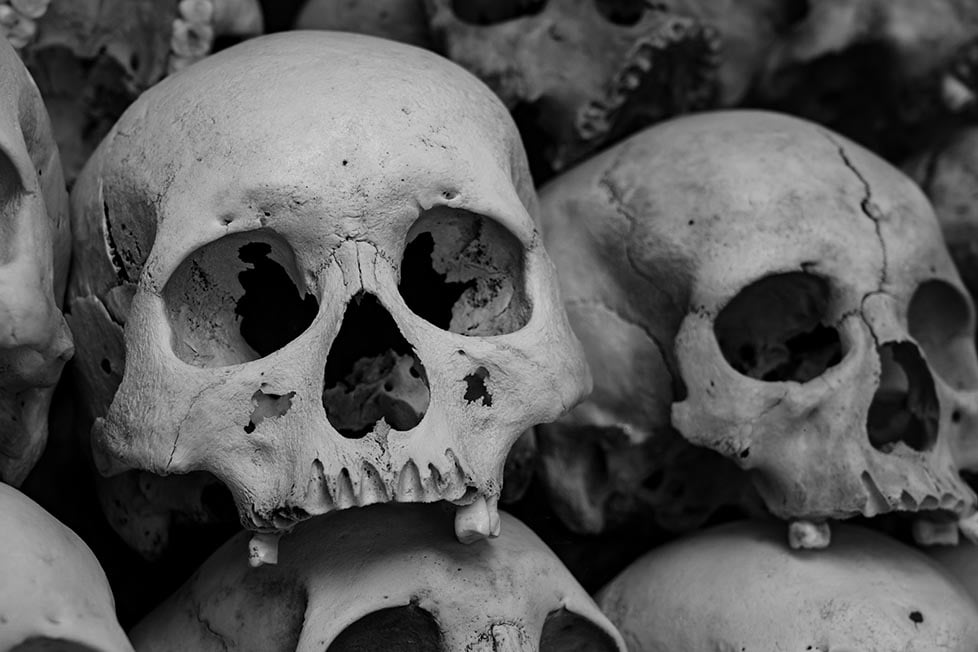
Everyone’s packing list is going to look a little different, but here are a few things I would never want to travel to Cambodia without…
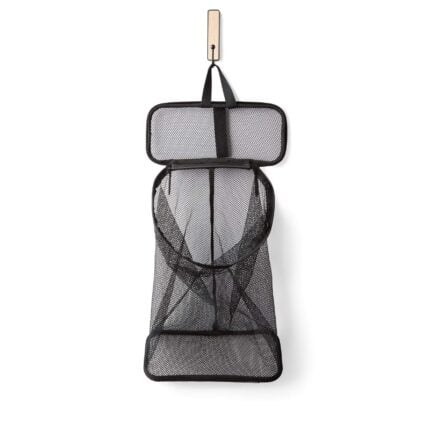
Hanging Laundry Bag
Trust us, this is an absolute game changer. Super compact, a hanging mesh laundry bag stops your dirty clothes from stinking, you don’t know how much you need one of these… so just get it, thank us later.
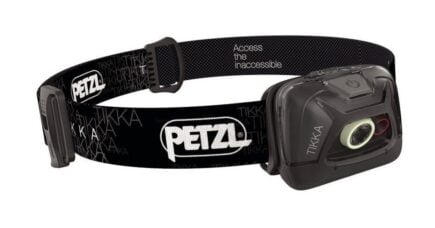
A decent head torch could save your life. If you want to explore caves, unlit temples, or simply find your way to the bathroom during a blackout, a headtorch is a must.

Yesim stands as a premier eSIM service provider, catering specifically to the mobile internet needs of travellers.

Monopoly Deal
Forget about Poker! Monopoly Deal is the single best travel card game that we have ever played. Works with 2-5 players and guarantees happy days.
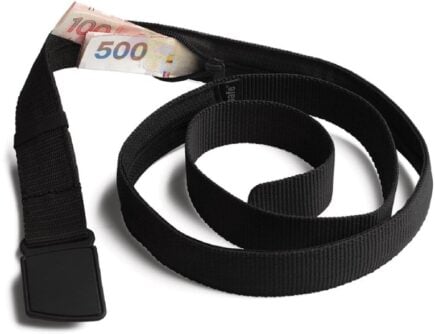
This is a regular looking belt with a concealed pocket on the inside – you can hide up to twenty notes inside and wear it through airport scanners without it setting them off.
Travel medical insurance is a must for Cambodia!
ALWAYS sort out your backpacker insurance before your trip. There’s plenty to choose from in that department, but a good place to start is Safety Wing .
They offer month-to-month payments, no lock-in contracts, and require absolutely no itineraries: that’s the exact kind of insurance long-term travellers and digital nomads need.

SafetyWing is cheap, easy, and admin-free: just sign up lickety-split so you can get back to it!
Click the button below to learn more about SafetyWing’s setup or read our insider review for the full tasty scoop.
Planning a safe trip to Cambodia can get quite overwhelming. That’s why we’ve listed and answered the most frequently asked questions on safety in Cambodia.
What should you avoid in Cambodia?
These are the things you should definitely avoid in Cambodia: – Don’t support the Elephant Rides – Avoid drinking tap water – DO NOT disrespect monks – Don’t let your personal belongings out of sight
Is Cambodia safer than Thailand?
Cambodia and Thailand are pretty much the same when it comes to safety. While Thailand is a better option for less experienced travellers and especially females, Cambodia is definitely more affordable. Both countries have unique issues but are overall safe if you use your common sense.
Is Cambodia safe for tourists?
Yes, Cambodia is safe for tourists. But like any other Southeast Asian country, you will have to watch out for petty crimes and pickpocketing. As long as you do a bit of research on the area and respect the culture, you will be perfectly fine in Cambodia.
Why is Cambodia dangerous?
The main crime in Cambodia is pickpocketing. Tourists are especially targeted when riding Tuk Tuks and exploring famous attractions. The weather and wildlife can get dangerous as well. Poisonous snakes aren’t uncommon in rural areas and heavy rainstorms can cause landslides.
Is Cambodia safe to live?
It’s very safe to live in Cambodia but all of what we’ve said before still applies . Living in Cambodia doesn’t automatically make the roads or beaches safe after dark. Cambodia is still a developing country. You’ll have to put up with crazy streets, power outages, and cockroaches in your apartment.
Yes, it can be safe, but Cambodia’s safety really depends on what kind of traveler you are. If you use your common sense and stay aware of your surroundings, visiting Cambodia can be perfectly safe. if you’re looking for trouble, you’ll definitely find it.
It’s easy to get a false sense of security when you’re visiting Cambodia. Just because it’s well-trodden and all the backpackers are having a great time getting wild, Cambodia is still poor and people can be desperate. You’re most likely a lot, LOT richer than many people here and if someone thinks they can make their life better by swiping your phone, can you blame them?
To avoid that, however, it’s all about being an inconspicuous, responsible traveler . This means having your phone out, dangling your bag around, and generally wandering about the place as if it’s a backpacker’s theme park. Being oblivious to the local culture, taboos, and the situation just isn’t smart .
That said, Cambodia is safe to visit !
Just remember that you aren’t immune to everything because you’re a backpacker and ‘not a tourist.’ Ultimately, staying aware of your surroundings and following the laws in Cambodia will help you ensure a safe and enjoyable voyage.
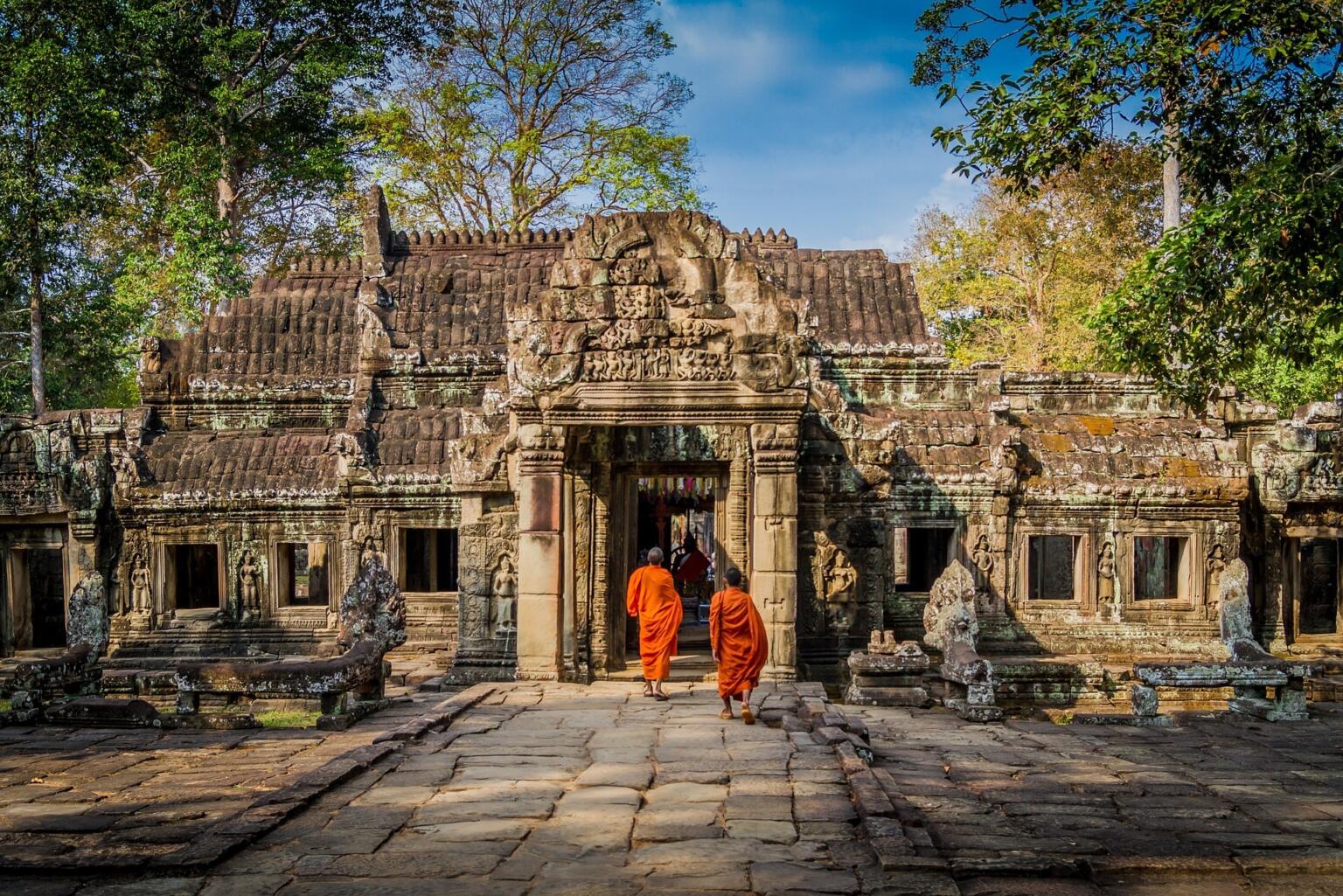
Looking for more info on traveling to Cambodia?
- Let me help you choose where to stay in Cambodia
- Plan the rest of your trip with our fantastic backpacking Cambodia travel guide!
- Get inspired by these EPIC bucket list adventures !
- See exactly how to travel the world for a year , even if you’re broke
- Explore with the ultimate peace of mind with top-notch medical evacuation insurance
Disclaimer: Safety conditions change all over the world on a daily basis. We do our best to advise but this info may already be out of date. Do your own research. Enjoy your travels!
Buy Us a Coffee !
A couple of you lovely readers suggested we set up a tip jar for direct support as an alternative to booking through our links. So we created one!
You can now buy The Broke Backpacker a coffee . If you like and use our content to plan your trips, it’s a much appreciated way to show appreciation 🙂

Monique MacPhail
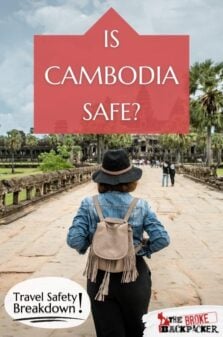
Share or save this post

never come back to siem reap it is the unsafest place in the world. thief have snatched my bag and made me fall fram tuk tuk. I am badly injured and have face and eye blooding. It was 2 weeks ago and just want to alert the tourists.
That’s horrible! I’m sorry to hear that 🙁 Angkor Wat is such a beautiful place though. I hope that people are able to visit here safely in the future.
I write this after 6 months traveling in south east asia I thought Cambodia should have more or less same standards as in Vietnam Thailand etc. – well NO
1. They charge in USD and I mean HIGH NUMBERS US DOLLARS!!! Prepare yourself: 1 Mango 1 USD (1 fruit not 1 kg) Main course average restaurant 6-8 USD, Beer 2 USD, Coffee 2 USD, Tuk Tuk 1 Km 3 USD
2. Accommodation Value for money that doesn’t make any sense (50 USD room no AC – or not working well AC its super hot in the rooms) 3. They look at tourists like dollars going around trying to rip you off in any chance!!! 4. Sihnoukville is the dirtiest place I have ever been to all beaches are completely ruined, sewage going free on the streets and poluuts the sea water. So many mosquitos and flies coming to the dirt – it is dangerous!! 5. Siem Reap – Tourist city. Monopoly of HIGH prices. u cannot bargain because everyone charge the same ridicules prices as I explained above.
2 Weeks in Cambodia cost as 2 months in Vietnam! That is the reason we made our trip here shorter and got a flight back to Vietnam which we LOVE!
Vietnam can be much cheaper than Cambodia but that’s only if we’re talking about places like Siem Reep, Angkor Wat, and Sookyville. If you get off the beaten path in Cambodia and visit less-touristy areas, prices should be much more reasonable.
Leave a Reply Cancel reply
Your email address will not be published. Required fields are marked *
Save my name, email, and website in this browser for the next time I comment.
Notify me of followup comments via e-mail.
- English (EN)
- Español (ES)
- Português (BR)
Is Cambodia Safe? Crime Rates & Safety Report
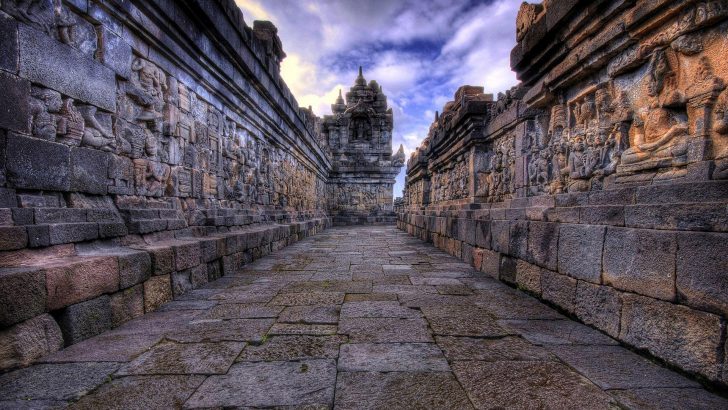
- Cambodia : Safety by City
The Kingdom of Cambodia is a country located in Southeast Asia, bordering Vietnam to the east, Laos to the north, Thailand to the northwest, and the Gulf of Thailand to the southwest.
It is a country with a heavy load of history, and a pretty long stream of bad luck: after being heavily bombed by the USA in the ’70s and surviving the horrors of the civil war, it started getting back on its feet no earlier than 1993.
And even though its political situation is still complicated and opaque, the security situation has improved immensely, and in the past couple of years, there has been a considerable increase in the numbers of tourists coming to visit Cambodia’s temples and beaches.
However, traveling beyond the most popular tourist destinations remains unpredictable and risky.
- Warnings & Dangers in Cambodia
OVERALL RISK: MEDIUM
Overall, Cambodia is a safe country, but there are extremely high rates of both petty crime and violent crime. You should be vigilant and take all possible precaution measures in order to minimize the risk of something going wrong.
TRANSPORT & TAXIS RISK: MEDIUM
When it comes to transport, it isn't very safe or reliable. You have to be very careful in public transport because there may be thieves lurking around, especially while you are entering the vehicle.Also, when renting a bike, be wary of someone pushing you off while you are riding and then taking the bike and riding off. Resisting may turn into a violent outcome so hand over everything immediately. Be aware of the fact that driving standards in Cambodia are poor, so try to avoid driving after dusk.
PICKPOCKETS RISK: MEDIUM
There is an extreme threat of petty crime. Pickpockets are practically an everyday occurrence and you should be extremely careful when handling your valuables and never carry your money in a purse or a pocket. The most risky locations are crowded places such as markets, public transport and bus and train stations.
NATURAL DISASTERS RISK: MEDIUM
During the monsoon season, which lasts from May to October, there is a risk of flooding, and typhoons and tsunamis are not a rarity either.
MUGGING RISK: MEDIUM
In the central areas of the country, the chances of getting mugged or kidnapped are low, but there are areas that are best avoided, mostly located on the brinks of the country.
TERRORISM RISK: LOW
There haven't been any terrorist attacks in Cambodia's recent history but they shouldn't be ruled out. Be aware of your surroundings at all times.
SCAMS RISK: MEDIUM
There is a number of scams performed on tourists, such as Cambodian custom officers in Poipet asking tourists to pay USD 45 for a visa on arrival, instead of USD 30. Insist on the regular price but stay friendly and keep smiling, they rarely insist it. Scams on the Thai side of the border are even more common. Don't embark on a 'government bus to the border', don't accept anyone's help, especially those 'working for Thai Immigration' at your hotel or elsewhere, and don't go to shops with signs 'visas available here' next to the border.
WOMEN TRAVELERS RISK: MEDIUM
Cambodia is not the safest choice for female solo travelers. . Sexual assaults do occur occasionally, and women in general tend to attract unwanted attention, particularly in Siem Reap. It is recommended not to ride a tuck-tuck after 8 pm if and of course, apply the basic precaution measures - avoid wearing purses and do not walk alone or roam around deserted or poorly lit streets and areas.
- So... How Safe Is Cambodia Really?
Cambodia is relatively safe to visit.
Violent crime exists, and the rates of armed robberies are high so you should remember not to resist if you find yourself in a similar situation and hand over your valuables immediately.
However, the tourists’ main concern is a petty crime such as pickpocketing, bag snatching, and other similar thefts.
Also, Cambodia went from being a cash-only country to a society where credit cards are more and more used and accepted, and with that credit card theft and cloning, so be careful when handling money and around ATMs.
Another issue in Cambodia can be its borders with Thailand that caused disputes between these two countries.
There were clashes between the troops of both Cambodia and Thailand and even though they straightened their relationship, caution is recommended when traveling around this area.
Other areas of concern are remote areas where stray landmines may be found, (these areas are usually unmarked), as well as roads after dusk, where many accidents may happen because of irresponsible drivers, so avoid driving at night.
- How Does Cambodia Compare?
- Useful Information
Most nationals do need a visa in order to enter Cambodia. A tourist Cambodian visa may be purchased at the airports in Phnom Penh and Siem Reap and borders, and they are valid for one month. Your passport needs to be valid for at least six months from the expiry date of the purchased visa. If you are not sure about your visa status, visit www.doyouneedvisa.com which will let you know whether or not you need visa based on your nationality and the country you want to visit.
Cambodian riel is the official currency in Cambodia. ATMs are increasingly available and charge a fee of 5$ per withdrawal. Credit cards are becoming more and more used and accepted, but be careful when handling them in public, since credit card thefts and cloning have been reported.
Cambodia is located in Southeast Asia in the tropical zone, and just like most of Southeast Asia, Cambodia is warm to hot during the entire year, and the climate is dominated by the annual monsoon cycle that alternates its wet and dry season. The wet season usually lasts from May to October.
Phnom Penh International Airport is the largest airport in Cambodia, located 10 km west of Phnom Penh, the country's capital city.
Travel Insurance
Just like anywhere else, we recommend getting travel insurance when traveling to Cambodia, since it covers not only the costs of medical problems, but also theft and loss of valuables.
Cambodia Weather Averages (Temperatures)
- Average High/Low Temperature
Cambodia - Safety by City
Explore cambodia.
- Best Places in Cambodia for Great Photos
- Where to Next?
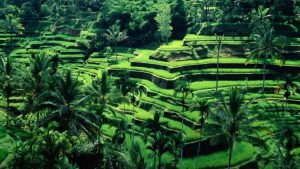
7 Reviews on Cambodia
Beautiful nation, tragic history, underrated. Go sometime for your own sake and learn about the history.
Great destination
Perhaps the writer needs to actually visit Cambodia, it’s by far one of the safest countries I’ve lived in. It is not risky to travel around, nor are there ever tsunamis. Petty theft is a small issue but violent crime is rare on foreigners. Its a great place to visit on your holidays
Couldn’t agree more. Just visited Cambodia (Aug 2022) as a solo traveller and absolutely loved it. I even biked through villages along the river and Tonle Sap in Siem Reap with no issues . In fact I was welcomed by all the locals
Hi Abdul, do you have any blog or something related to your trip. I am planning my trip to Cambodia with my bicycle. Cheers mate
They’re really friendly and somehow safe for foreigner. Also, there are many vlogger make videos in Cambodia as well. Cheers
Safe and must go country in the world
I have been there I found pretty safe ! Of course you need to be careful in Phnom penh ( capital ) at night ( it is a poor country . And in Siem riep . It is safe just be smart ok !! Lovely place to visit ( it is very emotional and sad the history) but it is a must go country. The south is lovely as well. A lot of mosquitos ( repellents is a must take) food it is ok ( South Asia food) don’t eat salads) and ENJOY 😉
Live there one year,every scam in the book,Get asked for weed and girls every second
Share Your Experience Cancel reply
Your Review
Title of your review
Article Contents
- Overall Risk
- Transport & Taxis Risk
- Pickpockets Risk
- Natural Disasters Risk
- Mugging Risk
- Terrorism Risk
- Women Travelers Risk
- Weather Averages (Temperatures)
- User Reviews
- Share Your Experience
Popular Destinations

Safety Index
Recent reviews & comments.
- Christian Lowe on Grand Junction
- Andrew Lang on Grand Junction
- Elliot Smith on Grand Junction
- Arnold Diesel on Socorro
- Trevor Long on Socorro
Popular US States
- Pennsylvania
- Travel Advisories |
- Contact Us |
- MyTravelGov |
Find U.S. Embassies & Consulates
Travel.state.gov, congressional liaison, special issuance agency, u.s. passports, international travel, intercountry adoption, international parental child abduction, records and authentications, popular links, travel advisories, mytravelgov, stay connected, legal resources, legal information, info for u.s. law enforcement, replace or certify documents.
Before You Go
Learn About Your Destination
While Abroad
Emergencies
Share this page:
Travel Advisory July 24, 2023
Cambodia - level 1: exercise normal precautions.
Reissued with obsolete COVID-19 page links removed.
Exercise normal precautions in Cambodia. Some areas have increased risks. Read the entire Travel Advisory.
Exercise increased precautions in:
- Phnom Penh due to crime.
- Very remote areas of Battambang, Banteay Meanchey, Pursat, Siem Reap, Pailin, and Kampong Thom provinces due to land mines.
Read the country information page for additional information on travel to Cambodia.
If you decide to travel to Cambodia:
- Enroll in the Smart Traveler Enrollment Program (STEP) to receive Alerts and make it easier to locate you in an emergency.
- Follow the Department of State on Facebook and Twitter .
- Review the Country Security Report for Cambodia.
· Visit the CDC page for the latest Travel Health Information related to your travel.
- Prepare a contingency plan for emergency situations. Review the Traveler’s Checklist .
Phnom Penh – Level 2: Exercise Increased Caution
Street crime, particularly phone and bag snatchings, occurs frequently in areas where foreigners gather; resistance can result in injury. Be aware of your surroundings at all times and to be extra vigilant when displaying items like jewelry, bags and cell phones in public. Violent crime, such as sexual assault and homicide, is common, sometimes against foreigners.
Do not physically resist any robbery attempt. Use caution when walking or driving at night.
Battambang, Banteay Meanchey, Pursat, Siem Reap, Pailin, and Kampong Thom provinces – Level 2: Exercise Increased Caution
Land mines and unexploded ordnance are found in very remote areas throughout Cambodia, and especially in Battambang, Banteay Meanchey, Pursat, Siem Reap, Pailin, and Kampong Thom provinces.
Do not touch unknown metal objects; instead notify the Cambodia Mine Action Center at 012-800-473/023-995-437. Use a local guide when walking in forested areas or dry rice paddies in these areas.
Embassy Messages
View Alerts and Messages Archive
Quick Facts
Six months.
One page is required per entry stamp; please note endorsement pages are not considered blank passport pages.
The import of local currency (Riel) is prohibited. When entering Cambodia foreign currency amounts over US $10,000 must be declared.
The export of local currency (Riel) is prohibited. Foreign currency can be taken out of the country up to the limit declared at customs on arrival.
Embassies and Consulates
U.s. embassy phnom penh.
#1, St. 96 (entrance on St. 51 between St. 96 and 102), Phnom Penh Telephone: 855-23-728-402, 051, or 234 Monday thru Friday 8:00 a.m. to 5:00 p.m. Emergency after-hours telephone: 855-23-728-000 Fax: 855-23-728-700 Email: [email protected] Facebook Twitter
Destination Description
Learn about the U.S. relationship to countries around the world.

Entry, Exit and Visa Requirements
Please visit the Embassy’s COVID-19 page for more information on entry/exit requirements related to COVID-19 in Cambodia.
You will need a valid passport and a Cambodian visa to enter Cambodia. Tourist and business visas are valid for one month from the date of entry into Cambodia. Cambodia offers on-line visa processing . You may also apply in person at the Cambodian Embassy located at 4530 16th Street NW, Washington, DC 20011, tel. 202-726-7742, fax 202-726-8381.
Tourists, diplomats, and business travelers may also obtain a Cambodian visa at the airports in Phnom Penh, Siem Reap, and at all major border crossings. Cambodian immigration officials at airports now collect fingerprints upon entry using an inkless, electronic process. You will need a passport valid for a minimum of six months beyond the date of entry into Cambodia.
If you remain in Cambodia beyond the date of your authorized stay, Cambodian immigration officials will likely impose a fine of $10 per day overstayed. In cases of excessive overstays, you may be arrested for violating immigration laws and detained as you undergo official deportation proceedings at your own expense. Deportation from Cambodia may result in your being prohibited from reentering Cambodia in the future. You should contact the nearest Cambodian embassy or consulate, or visit the Embassy of the Kingdom of Cambodia website for the most current visa information.
The U.S. Department of State is unaware of any HIV/AIDS entry restrictions for visitors to or foreign residents of Cambodia
Safety and Security
The Department of State is concerned that individuals and groups may be planning terrorist actions against U.S. citizens and interests, including at sites frequented by Westerners in Southeast Asia. Extremist groups in Southeast Asia have transnational capabilities to carry out attacks against locations where Westerners congregate. Although the extremist threat in Cambodia is considered low and terrorist attacks are not common, U.S. citizens residing in, or traveling to, Cambodia should exercise caution in clubs, discos, bars, restaurants, hotels, places of worship, schools, outdoor recreation venues, tourist areas, beach resorts, and other places frequented by foreigners. U.S. citizens should remain vigilant with regard to their personal security and avoid ongoing police enforcement actions, crowds, and demonstrations. See Department of State’s Worldwide Caution .
Land mines and unexploded ordnance are found in remote rural areas throughout Cambodia, and especially in Battambang, Banteay Meanchey, Pursat, Siem Reap, Kampong Thom, and Oddar Meanchey provinces. Travelers in these regions should never walk in forested areas or even in dry rice paddies without a local guide. Areas around small bridges on secondary roads are particularly dangerous. Travelers should not touch anything that resembles a mine or unexploded ordnance; they should notify the Cambodia Mine Action Center at 012-800-473/023-995-437.
Crime: Cambodia has a critical crime rate, including street crime. Military weapons and explosives are readily available to criminals despite authorities’ efforts to collect and destroy such weapons. Armed robberies occur frequently, and foreign residents and visitors, including U.S. citizens, are among the victims. The Embassy has also received reports that residences and hotel rooms of U.S. citizens in Phnom Penh were burglarized while the occupants were asleep.
The most common type of theft is “snatch and grab” robbery, and anything that can be quickly grabbed is at risk: cameras, jewelry, purses, backpacks, mobile phones, etc. Exercise caution and keep belongings out of sight if you travel via “tuk-tuk,” as passengers in these open-air vehicles have been targeted by thieves. If walking along the street, make yourself less of a target by carrying bags or items in your hand or on the shoulder that is furthest from the street. If someone attempts to rob you, you should surrender your valuables immediately, since any perceived resistance may be met with physical violence, including lethal force. The U.S. Embassy has received reports of violent robberies escalating into fatalities.
Pickpockets, some who are masquerading as beggars, are present in the markets and at the tourist sites. Sometimes they may act overly friendly, placing their hand on your shoulder or back to distract you in order to pick your pocket.
To avoid the risk of theft or confiscation of original documents, the U.S. Embassy advises its personnel and all U.S. citizens traveling to, or residing in, Cambodia to carry photocopies of their U.S. passport, driver's license, and other important documents and to leave the originals in a hotel safe or other secure place. The U.S. Embassy advises citizens not to give their passport as collateral for motorcycle rentals, hotels, etc. Local police rarely investigate reports of crime against tourists, and travelers should not expect to recover stolen items. It has also been reported that some police stations charge foreigners between $20 and $100 to file a police report.
Foreigners travelling to Cambodia should be aware of common scams targeting tourists, often involving card games. [MWP(P1] The Embassy has received reports of U.S. citizens being approached by individuals in public locations, such as popular shopping malls, and being invited to their homes where they end up participating in card games. These are often scams to steal tourists’ money. If you find yourself a victim of one of these scams, you should contact the U.S. Embassy.
Foreigners travelling to Cambodia should be aware of crime targeting tourists involving drugged drinks. The Embassy has received reports of U.S. citizens’ drinks being drugged at bars in order to incapacitate them for theft or sexual assault. Do not accept drinks from strangers and do not leave drinks unattended.
The U.S. Embassy advises citizens to be wary of scams involving individuals claiming they are in Cambodia and need financial assistance from the United States. The Embassy has determined that many of these requests are fraudulent and the individuals making the requests use false identities. In the past year, numerous confirmed media reports of large-scale scam operations have led to a crackdown by Cambodian authorities. These operations have been reported to lure non-Cambodians with false promises of gainful employment. Victims of this false recruitment have then been made to participate in the online/phone-based financial confidence scams.
See the Department of State and the FBI pages for information on scams.
There have been numerous reports of visitors receiving fake or novelty $50 and $100 bills from ATM machines and banks across Cambodia. When receiving money from ATMs or bank tellers, you should count and examine the money while still in the presence of the ATM camera or bank teller. The fake money typically has a different feel than real U.S. currency and often has markings on the lower left that indicate it is for novelty purposes. If a suspicious bill is discovered, it should be shown to the ATM camera or teller, and the bank should be notified immediately.
The U.S. Embassy advises its personnel who travel to the provinces outside of Phnom Penh to exercise caution outside the provincial towns at all times. Many rural parts of the country remain without effective policing. Avoid walking alone after dusk anywhere in Sihanoukville, especially along the waterfront. You should be particularly vigilant during annual festivals and at tourist sites in Phnom Penh, Siem Reap, and Sihanoukville, where there have been marked increases in motorcycle “snatch and grab” thefts of bags and purses.
If you are visiting Cambodia, you should practice sound personal security awareness by varying your routes and routines, maintaining a low profile, not carrying or displaying large amounts of cash, not wearing flashy or expensive jewelry, and not walking alone after dark. In addition, you should travel by automobile and not use local moto-taxis or cyclos (passenger-carrying bicycles). These vehicles are more vulnerable to armed robberies and offer no protection against injury when involved in traffic accidents.
U.S. citizens are advised not to engage in commercial surrogacy arrangements in Cambodia. In October 2016, the Government of Cambodia issued an official proclamation banning commercial surrogacy in Cambodia. Please keep in mind that U.S. citizens and other foreigners in Cambodia are subject to Cambodian laws and procedures.
Although gambling and casinos are legal in Cambodia, the U.S. Embassy strongly encourages all travelers to be cautious in choosing to visit casinos or related gambling centers in Cambodia. The U.S. Embassy is aware of numerous reported incidents at casinos throughout Cambodia. In the past year, these incidents such as fires at casinos resulting in multiple fatalities, violent assaults, murders, and suicides under suspicious circumstances have occurred.
Victims of Crime: Report crimes to the local police and contact the U.S. Embassy at 023-728-000. Remember that local authorities are responsible for investigating and prosecuting crimes.
In cases of sexual assault, U.S. citizen victims should contact the U.S. Embassy first before contacting local police or authorities.
See our webpage on help for U.S. victims of crime overseas .
- help you find appropriate medical care
- assist you in reporting a crime to the police
- contact relatives or friends with your written consent
- explain the local criminal justice process in general terms
- provide a list of local attorneys
- provide our information on victim’s compensation programs in the U.S .
- provide an emergency loan for repatriation to the United States and/or limited medical support in cases of destitution
- help you find accommodation and arrange flights home
- replace a stolen or lost passport
Domestic Violence: U.S. citizen victims of domestic violence may contact the Embassy for assistance.
Tourism: The tourism industry is unevenly regulated, and safety inspections for equipment and facilities do not commonly occur. Hazardous areas/activities are not always identified with appropriate signage, and staff may not be trained or certified either by the host government or by recognized authorities in the field. In the event of an injury, appropriate medical treatment is typically available only in/near major cities. First responders are generally unable to access areas outside of major cities and to provide urgent medical treatment. U.S. citizens are encouraged to purchase medical evacuation insurance .
Local Laws & Special Circumstances
Criminal Penalties: You are subject to local laws. If you violate local laws, even unknowingly, you may be expelled, arrested, or imprisoned. Penalties for possessing, using, or trafficking in illegal drugs in Cambodia are severe, and convicted offenders can expect long jail sentences and heavy fines. If you break local laws in Cambodia, your U.S. passport won’t help you avoid arrest or prosecution.
The same rights and protections afforded those accused of a crime in the U.S. are not guaranteed in Cambodia, and the judicial process may be influenced by political, personal, and financial connections. In both the criminal and civil judicial systems, resources devoted to the investigation/discovery and trial process fall far below the standard expected in the United States. Cambodia routinely employs pre-trial detention for those charged with criminal offenses, sometimes for long periods of time before a trial is scheduled. Prison conditions in Cambodia are substandard and overcrowded, with little access to health care or basic nutritional requirements.
U.S. citizens in Cambodia should be aware that there are limits to the assistance the Embassy can offer to those with concerns about due process or the fairness of their trial, as the Embassy is unable to interfere in the legal processes of a host country.
You can be prosecuted in the United States for engaging in sexual conduct with children or for using or disseminating child pornography in a foreign country regardless of the legality of these activities under that country’s laws. Counterfeit and pirated goods are illegal in the United States, and if you purchase them in a foreign country, you may be breaking local law as well.
Arrest Notifications: If you are arrested or detained, ask police or prison officials to notify the U.S. Embassy immediately. See our webpage for further information.
Faith-Based Travelers: See our following webpages for details:
- Faith-Based Travel Information
- International Religious Freedom Report – see country reports
- Human Rights Report – see country reports
- Hajj Fact Sheet for Travelers
- Best Practices for Volunteering Abroad
LGBTI Travelers: While there are no legal restrictions on same-sex sexual relations or the organization of LGBTI events in Cambodia, same sex marriage is not permitted. While Cambodians are relatively tolerant toward foreigners, LGBTI Cambodians routinely face discrimination and harassment, especially outside major urban areas. Public displays of affection are generally frowned upon for couples of any sexual orientation.
See our LGBTI Travel Information page and section six of our Human Rights report for further details.
Travelers Who Require Accessibility Assistance: While in Cambodia, individuals with disabilities may find accessibility and accommodation very different from what they find in the United States. Currently, except for buildings and hotels that have been built under international standards, most public places and public transportation are not accessible. Persons with disabilities will face difficulties with Cambodia’s sidewalks, rest rooms, road crossings, and tourist areas.
Students: See our Students Abroad page and FBI travel tips .
Women Travelers: There have been reports of sexual assaults in the vicinity of drinking establishments and possible drugs being used to incapacitate female travelers. See our travel tips for Women Travelers .
Water Festival: During this annual festival, which takes place in November, the population in Phnom Penh increases significantly as millions of Cambodians from every town and province flock to the capital for three days. For personal safety and security, you should avoid crowded areas near the riverfront during the Water Festival holiday.
Customs: Cambodian customs authorities may enforce strict regulations concerning temporary importation into or export from Cambodia of items such as medications, firearms, antiquities, or ivory. It is advisable to contact the Embassy of Cambodia in Washington D.C. for specific information regarding customs requirements.
Restrictions on Freedom of Expression and Association: There are freedom of speech restrictions in Cambodia. Anyone who criticizes or insults the King by any means could face between one to five years in prison. This ban includes insults or criticism made online and via social media. The government of Cambodia has used libel and slander laws to restrict public discussion on topics it deems sensitive or against its interests.
Dual Nationality: Dual nationality is allowed under Cambodia's 1996 nationality law. However, if you have Cambodian nationality and possess another nationality, you may be viewed as a Cambodian citizen in any court proceedings and face stricter sentences.
Business Transactions: Some U.S. citizens have reported threats of personal injury, extortion, detention, or kidnapping related to personal business disputes, in particular those involving real estate. If you are planning to engage in real estate or other significant financial transactions, please proceed with caution and retain the appropriate legal counsel.
Financial Transaction: The U.S. dollar is widely used, especially for larger transactions, and most prices are quoted in dollars. Ripped, torn, or stained U.S. bills are not accepted. Authorities encourage greater use of the Cambodian riel, but it is less favored and is mostly given to tourists as change for dollar purchases. The riel is commonly used in smaller towns and rural areas. Credit cards are accepted at some establishments within Cambodia, and a number of banks in Phnom Penh accept credit cards for cash advances. Credit cards are often subject to a service charge. Banks and major hotels accept travelers' checks but usually charge a service fee. Several international banks operate ATM machines that allow travelers to obtain U.S. dollar currency in Phnom Penh, Siem Reap, and other urban centers. Personal checks are not generally accepted. Several banks serve as Western Union agents, to which funds can be wired, including in Phnom Penh, Siem Reap, Sihanoukville, and other provincial cities. Information on Western Union can be found at their website .
Photography: Taking photographs of anything that could be perceived as being of military or security interest — including government buildings, military installations, airfields, and bridges — may result in problems with the authorities and confiscation of your camera.
Medical facilities and services in Cambodia do not meet international standards. Both Phnom Penh and Siem Reap have a limited number of internationally run clinics and hospitals that can provide basic medical care and stabilization. Medical care outside of these two cities is almost non-existent. Local pharmacies provide a limited supply of prescription and over-the-counter medications. Because the quality of locally obtained medications can vary greatly, make sure to bring a supply of your medications adequate for the duration of your stay in Cambodia. You should be wary of purchasing local medication. Counterfeit medication is readily available, often indiscernible from authentic medication, and potentially lethal.
Be aware that neither U.S. Medicare nor Medicaid apply overseas.
Medical Insurance: Make sure your health insurance plan provides coverage overseas. Most care providers overseas only accept cash payments. See our webpage for more information on insurance coverage overseas. Visit the U.S. Centers for Disease Control and Prevention for more information on what type of insurance you should consider before you travel overseas.
Supplemental insurance to cover medical evacuation is strongly recommended.
Always carry your prescription medication in original packaging, along with your doctor’s prescription. Check with the government of Cambodia to ensure the medication is legal in Cambodia. Always, carry your prescription medication in the original packaging with your doctor’s prescription.
Be careful if purchasing off-brand medication from pharmacies in Cambodia. Drugs sold in pharmacies can be fake and possibly dangerous.
Malaria, Dengue and Tuberculosis are serious health concerns in Cambodia. For further information, please consult the CDC .
Vaccinations: Be up-to-date on all vaccinations recommended by the U.S. Centers for Disease Control and Prevention.
Further health information:
- World Health Organization
- U.S. Centers for Disease Control and Prevention (CDC)
Air Quality: Visit AirNow for information on air quality at U.S. Embassies and Consulates.
Travel and Transportation
Road Condition and Safety: You should not drive at night in Cambodia outside of city limits. Roads between major areas are adequate; however, roads leading to rural areas are poor. During the rainy season, road conditions deteriorate considerably, and roadside assistance is non-existent. Cambodian drivers routinely ignore traffic laws and vehicles are poorly maintained. Intoxicated drivers are commonplace, particularly during the evening hours. Travel is recommended in daylight between the hours of 6:30 a.m. and 5:30 p.m. There are also frequent bus accidents. Serious flooding occurs throughout Cambodia from June through November. Travel on unpaved or dirt roads is difficult after heavy rainfall. The National Route highways are the only roads that can be traveled, with caution, during this time of the year.
Traffic Laws: In the event you are in a traffic accident, you should cooperate with the police. You should also contact your insurance company for guidance in dealing with the other party and the police. To avoid the risk of theft or confiscation of original documents, the U.S. Embassy advises its personnel and all U.S. citizens traveling to, or residing in, Cambodia to carry photocopies of their U.S. passport, driver's license, and other important documents and to leave the originals in a hotel safe or other secure place.
While in Cambodia, you may encounter road conditions that differ significantly from those in the United States. Traffic in Cambodia is composed of a mix of automobiles, commercial trucks, motorcycles, bicycles, and tuk tuks. As a result of poor roads, driver intoxication, and disregard for traffic laws, traffic accidents are a common occurrence. You should exercise great caution in moving through the country, regardless of mode of transportation.
Public Transportation: Travelers should exercise caution when using inter-city buses, including those to popular tourist destinations such as Siem Reap and Sihanoukville. Despite the wide availability of moto-taxis, you should not use them due to safety concerns. Be vigilant if traveling by “tuk-tuk” or “cyclo” as personal belongings can be easily stolen. Organized emergency services for victims of traffic accidents are non-existent outside of major urban areas, and those available in major urban areas are inadequate.
See our Road Safety page for more information. Visit the website of Cambodia’s national tourist office and national authority responsible for road safety .
Aviation Safety Oversight: As there is no direct commercial air service to the United States by carriers registered in Cambodia, the U.S. Federal Aviation Administration (FAA) has not assessed the government of Cambodia’s Civil Aviation Authority for compliance with International Civil Aviation Organization (ICAO) aviation safety standards. Further information may be found on the FAA’s safety assessment page .
Maritime Travel: The Commandant of the Coast Guard has determined that effective anti-terrorism measures are not in place in Cambodia ports and has imposed conditions of entry on vessels that arrive in U.S. ports having visited ports in Cambodia. Mariners and passengers on commercial vessels traveling through the ports of Cambodia should exercise increased caution.
Mariners planning travel to Cambodia should also check for U.S. maritime advisories and alerts at Maritime Security Communications with Industry (MSCI) Web Portal | MARAD (dot.gov) . Information may also be posted to the U.S. Coast Guard homeport website , and the NGA broadcast warnings website (select “broadcast warnings”).
For additional travel information
- Enroll in the Smart Traveler Enrollment Program (STEP) to receive security messages and make it easier to locate you in an emergency.
- Call us in Washington, D.C. at 1-888-407-4747 (toll-free in the United States and Canada) or 1-202-501-4444 (from all other countries) from 8:00 a.m. to 8:00 p.m., Eastern Standard Time, Monday through Friday (except U.S. federal holidays).
- See the State Department’s travel website for the Worldwide Caution and Travel Advisories .
- Follow us on X (formerly known as "Twitter") and Facebook .
- See traveling safely abroad for useful travel tips.
Review information about International Parental Child Abduction in Cambodia . For additional IPCA-related information, please see the International Child Abduction Prevention and Return Act ( ICAPRA ) report.
Travel Advisory Levels
Assistance for u.s. citizens, cambodia map, learn about your destination, enroll in step.

Subscribe to get up-to-date safety and security information and help us reach you in an emergency abroad.
Recommended Web Browsers: Microsoft Edge or Google Chrome.
Make two copies of all of your travel documents in case of emergency, and leave one with a trusted friend or relative.
Afghanistan
Antigua and Barbuda
Bonaire, Sint Eustatius, and Saba
Bosnia and Herzegovina
British Virgin Islands
Burkina Faso
Burma (Myanmar)
Cayman Islands
Central African Republic
Cote d Ivoire
Czech Republic
Democratic Republic of the Congo
Dominican Republic
El Salvador
Equatorial Guinea
Eswatini (Swaziland)
Falkland Islands
France (includes Monaco)
French Guiana
French Polynesia
French West Indies
Guadeloupe, Martinique, Saint Martin, and Saint Barthélemy (French West Indies)
Guinea-Bissau
Isle of Man
Israel, The West Bank and Gaza
Liechtenstein
Marshall Islands
Netherlands
New Caledonia
New Zealand
North Korea (Democratic People's Republic of Korea)
Papua New Guinea
Philippines
Republic of North Macedonia
Republic of the Congo
Saint Kitts and Nevis
Saint Lucia
Saint Vincent and the Grenadines
Sao Tome and Principe
Saudi Arabia
Sierra Leone
Sint Maarten
Solomon Islands
South Africa
South Korea
South Sudan
Switzerland
The Bahamas
Timor-Leste
Trinidad and Tobago
Turkmenistan
Turks and Caicos Islands
United Arab Emirates
United Kingdom
Vatican City (Holy See)
External Link
You are about to leave travel.state.gov for an external website that is not maintained by the U.S. Department of State.
Links to external websites are provided as a convenience and should not be construed as an endorsement by the U.S. Department of State of the views or products contained therein. If you wish to remain on travel.state.gov, click the "cancel" message.
You are about to visit:
You are using an outdated browser. Upgrade your browser today or install Google Chrome Frame to better experience this site.
Cambodia Traveler View
Travel health notices, vaccines and medicines, non-vaccine-preventable diseases, stay healthy and safe.
- Packing List
After Your Trip
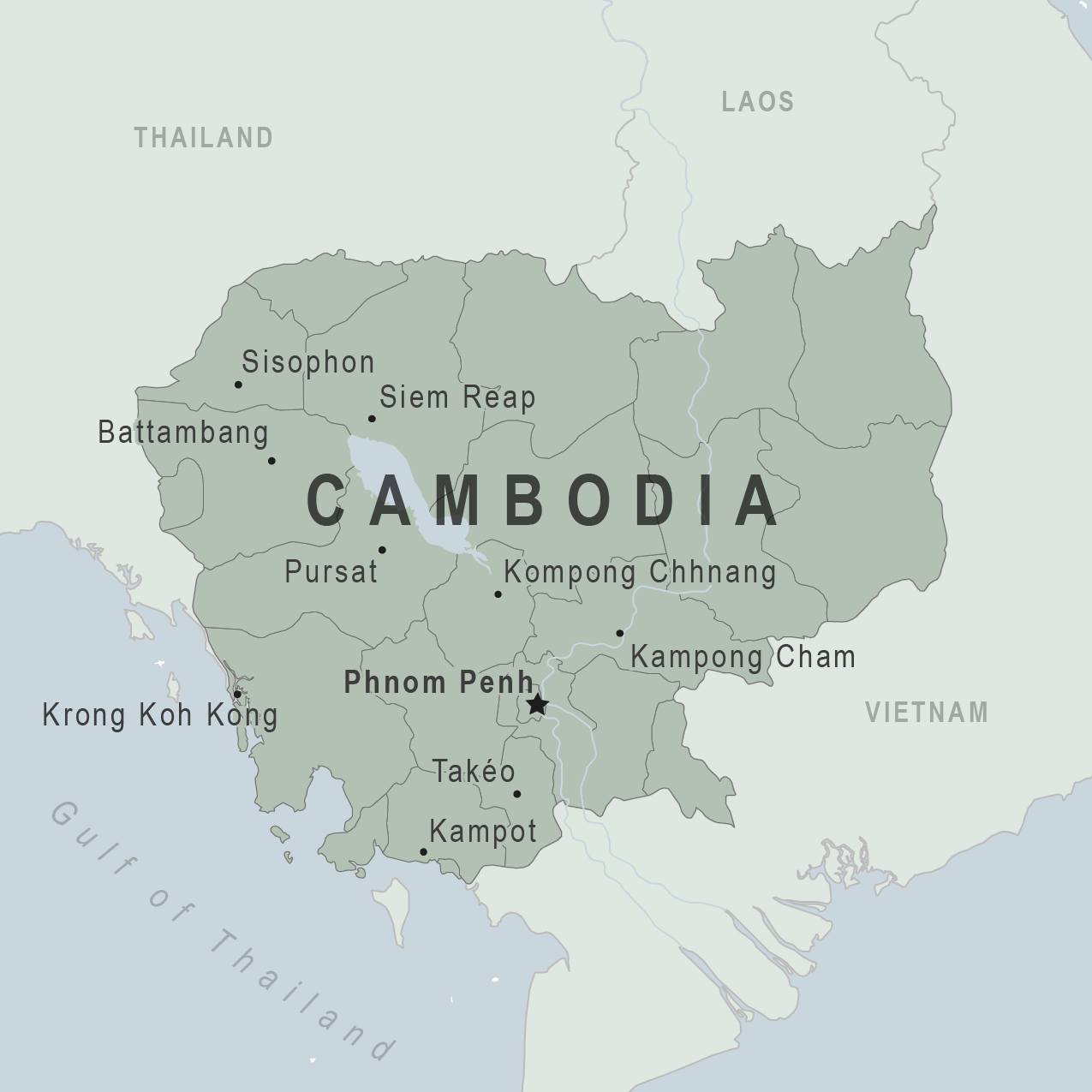
There are no notices currently in effect for Cambodia.
⇧ Top
Check the vaccines and medicines list and visit your doctor at least a month before your trip to get vaccines or medicines you may need. If you or your doctor need help finding a location that provides certain vaccines or medicines, visit the Find a Clinic page.
- Avoid contaminated water
Leptospirosis
How most people get sick (most common modes of transmission)
- Touching urine or other body fluids from an animal infected with leptospirosis
- Swimming or wading in urine-contaminated fresh water, or contact with urine-contaminated mud
- Drinking water or eating food contaminated with animal urine
- Avoid contaminated water and soil
- Avoid floodwater
Clinical Guidance
Schistosomiasis
- Wading, swimming, bathing, or washing in contaminated freshwater streams, rivers, ponds, lakes, or untreated pools.
Avoid bug bites
Chikungunya
- Mosquito bite
- Avoid Bug Bites
- Mosquito bite
- An infected pregnant woman can spread it to her unborn baby
Airborne & droplet
Avian/bird flu.
- Being around, touching, or working with infected poultry, such as visiting poultry farms or live-animal markets
- Avoid domestic and wild poultry
- Breathing in air or accidentally eating food contaminated with the urine, droppings, or saliva of infected rodents
- Bite from an infected rodent
- Less commonly, being around someone sick with hantavirus (only occurs with Andes virus)
- Avoid rodents and areas where they live
- Avoid sick people
Tuberculosis (TB)
- Breathe in TB bacteria that is in the air from an infected and contagious person coughing, speaking, or singing.
Learn actions you can take to stay healthy and safe on your trip. Vaccines cannot protect you from many diseases in Cambodia, so your behaviors are important.
Eat and drink safely
Food and water standards around the world vary based on the destination. Standards may also differ within a country and risk may change depending on activity type (e.g., hiking versus business trip). You can learn more about safe food and drink choices when traveling by accessing the resources below.
- Choose Safe Food and Drinks When Traveling
- Water Treatment Options When Hiking, Camping or Traveling
- Global Water, Sanitation and Hygiene (WASH)
- Avoid Contaminated Water During Travel
You can also visit the Department of State Country Information Pages for additional information about food and water safety.
Prevent bug bites
Bugs (like mosquitoes, ticks, and fleas) can spread a number of diseases in Cambodia. Many of these diseases cannot be prevented with a vaccine or medicine. You can reduce your risk by taking steps to prevent bug bites.
What can I do to prevent bug bites?
- Cover exposed skin by wearing long-sleeved shirts, long pants, and hats.
- Use an appropriate insect repellent (see below).
- Use permethrin-treated clothing and gear (such as boots, pants, socks, and tents). Do not use permethrin directly on skin.
- Stay and sleep in air-conditioned or screened rooms.
- Use a bed net if the area where you are sleeping is exposed to the outdoors.
What type of insect repellent should I use?
- FOR PROTECTION AGAINST TICKS AND MOSQUITOES: Use a repellent that contains 20% or more DEET for protection that lasts up to several hours.
- Picaridin (also known as KBR 3023, Bayrepel, and icaridin)
- Oil of lemon eucalyptus (OLE) or para-menthane-diol (PMD)
- 2-undecanone
- Always use insect repellent as directed.
What should I do if I am bitten by bugs?
- Avoid scratching bug bites, and apply hydrocortisone cream or calamine lotion to reduce the itching.
- Check your entire body for ticks after outdoor activity. Be sure to remove ticks properly.
What can I do to avoid bed bugs?
Although bed bugs do not carry disease, they are an annoyance. See our information page about avoiding bug bites for some easy tips to avoid them. For more information on bed bugs, see Bed Bugs .
For more detailed information on avoiding bug bites, see Avoid Bug Bites .
Stay safe outdoors
If your travel plans in Cambodia include outdoor activities, take these steps to stay safe and healthy during your trip.
- Stay alert to changing weather conditions and adjust your plans if conditions become unsafe.
- Prepare for activities by wearing the right clothes and packing protective items, such as bug spray, sunscreen, and a basic first aid kit.
- Consider learning basic first aid and CPR before travel. Bring a travel health kit with items appropriate for your activities.
- If you are outside for many hours in heat, eat salty snacks and drink water to stay hydrated and replace salt lost through sweating.
- Protect yourself from UV radiation : use sunscreen with an SPF of at least 15, wear protective clothing, and seek shade during the hottest time of day (10 a.m.–4 p.m.).
- Be especially careful during summer months and at high elevation. Because sunlight reflects off snow, sand, and water, sun exposure may be increased during activities like skiing, swimming, and sailing.
- Very cold temperatures can be dangerous. Dress in layers and cover heads, hands, and feet properly if you are visiting a cold location.
Stay safe around water
- Swim only in designated swimming areas. Obey lifeguards and warning flags on beaches.
- Practice safe boating—follow all boating safety laws, do not drink alcohol if driving a boat, and always wear a life jacket.
- Do not dive into shallow water.
- Do not swim in freshwater in developing areas or where sanitation is poor.
- Avoid swallowing water when swimming. Untreated water can carry germs that make you sick.
- To prevent infections, wear shoes on beaches where there may be animal waste.
Schistosomiasis, a parasitic infection that can be spread in fresh water, is found in Cambodia. Avoid swimming in fresh, unchlorinated water, such as lakes, ponds, or rivers.
Keep away from animals
Most animals avoid people, but they may attack if they feel threatened, are protecting their young or territory, or if they are injured or ill. Animal bites and scratches can lead to serious diseases such as rabies.
Follow these tips to protect yourself:
- Do not touch or feed any animals you do not know.
- Do not allow animals to lick open wounds, and do not get animal saliva in your eyes or mouth.
- Avoid rodents and their urine and feces.
- Traveling pets should be supervised closely and not allowed to come in contact with local animals.
- If you wake in a room with a bat, seek medical care immediately. Bat bites may be hard to see.
All animals can pose a threat, but be extra careful around dogs, bats, monkeys, sea animals such as jellyfish, and snakes. If you are bitten or scratched by an animal, immediately:
- Wash the wound with soap and clean water.
- Go to a doctor right away.
- Tell your doctor about your injury when you get back to the United States.
Consider buying medical evacuation insurance. Rabies is a deadly disease that must be treated quickly, and treatment may not be available in some countries.
Reduce your exposure to germs
Follow these tips to avoid getting sick or spreading illness to others while traveling:
- Wash your hands often, especially before eating.
- If soap and water aren’t available, clean hands with hand sanitizer (containing at least 60% alcohol).
- Don’t touch your eyes, nose, or mouth. If you need to touch your face, make sure your hands are clean.
- Cover your mouth and nose with a tissue or your sleeve (not your hands) when coughing or sneezing.
- Try to avoid contact with people who are sick.
- If you are sick, stay home or in your hotel room, unless you need medical care.
Avoid sharing body fluids
Diseases can be spread through body fluids, such as saliva, blood, vomit, and semen.
Protect yourself:
- Use latex condoms correctly.
- Do not inject drugs.
- Limit alcohol consumption. People take more risks when intoxicated.
- Do not share needles or any devices that can break the skin. That includes needles for tattoos, piercings, and acupuncture.
- If you receive medical or dental care, make sure the equipment is disinfected or sanitized.
Know how to get medical care while traveling
Plan for how you will get health care during your trip, should the need arise:
- Carry a list of local doctors and hospitals at your destination.
- Review your health insurance plan to determine what medical services it would cover during your trip. Consider purchasing travel health and medical evacuation insurance.
- Carry a card that identifies, in the local language, your blood type, chronic conditions or serious allergies, and the generic names of any medications you take.
- Some prescription drugs may be illegal in other countries. Call Cambodia’s embassy to verify that all of your prescription(s) are legal to bring with you.
- Bring all the medicines (including over-the-counter medicines) you think you might need during your trip, including extra in case of travel delays. Ask your doctor to help you get prescriptions filled early if you need to.
Many foreign hospitals and clinics are accredited by the Joint Commission International. A list of accredited facilities is available at their website ( www.jointcommissioninternational.org ).
In some countries, medicine (prescription and over-the-counter) may be substandard or counterfeit. Bring the medicines you will need from the United States to avoid having to buy them at your destination.
Malaria is a risk in some parts of Cambodia. If you are going to a risk area, fill your malaria prescription before you leave, and take enough with you for the entire length of your trip. Follow your doctor’s instructions for taking the pills; some need to be started before you leave.
Select safe transportation
Motor vehicle crashes are the #1 killer of healthy US citizens in foreign countries.
In many places cars, buses, large trucks, rickshaws, bikes, people on foot, and even animals share the same lanes of traffic, increasing the risk for crashes.
Be smart when you are traveling on foot.
- Use sidewalks and marked crosswalks.
- Pay attention to the traffic around you, especially in crowded areas.
- Remember, people on foot do not always have the right of way in other countries.
Riding/Driving
Choose a safe vehicle.
- Choose official taxis or public transportation, such as trains and buses.
- Ride only in cars that have seatbelts.
- Avoid overcrowded, overloaded, top-heavy buses and minivans.
- Avoid riding on motorcycles or motorbikes, especially motorbike taxis. (Many crashes are caused by inexperienced motorbike drivers.)
- Choose newer vehicles—they may have more safety features, such as airbags, and be more reliable.
- Choose larger vehicles, which may provide more protection in crashes.
Think about the driver.
- Do not drive after drinking alcohol or ride with someone who has been drinking.
- Consider hiring a licensed, trained driver familiar with the area.
- Arrange payment before departing.
Follow basic safety tips.
- Wear a seatbelt at all times.
- Sit in the back seat of cars and taxis.
- When on motorbikes or bicycles, always wear a helmet. (Bring a helmet from home, if needed.)
- Avoid driving at night; street lighting in certain parts of Cambodia may be poor.
- Do not use a cell phone or text while driving (illegal in many countries).
- Travel during daylight hours only, especially in rural areas.
- If you choose to drive a vehicle in Cambodia, learn the local traffic laws and have the proper paperwork.
- Get any driving permits and insurance you may need. Get an International Driving Permit (IDP). Carry the IDP and a US-issued driver's license at all times.
- Check with your auto insurance policy's international coverage, and get more coverage if needed. Make sure you have liability insurance.
- Avoid using local, unscheduled aircraft.
- If possible, fly on larger planes (more than 30 seats); larger airplanes are more likely to have regular safety inspections.
- Try to schedule flights during daylight hours and in good weather.
Medical Evacuation Insurance
If you are seriously injured, emergency care may not be available or may not meet US standards. Trauma care centers are uncommon outside urban areas. Having medical evacuation insurance can be helpful for these reasons.
Helpful Resources
Road Safety Overseas (Information from the US Department of State): Includes tips on driving in other countries, International Driving Permits, auto insurance, and other resources.
The Association for International Road Travel has country-specific Road Travel Reports available for most countries for a minimal fee.
Maintain personal security
Use the same common sense traveling overseas that you would at home, and always stay alert and aware of your surroundings.
Before you leave
- Research your destination(s), including local laws, customs, and culture.
- Monitor travel advisories and alerts and read travel tips from the US Department of State.
- Enroll in the Smart Traveler Enrollment Program (STEP) .
- Leave a copy of your itinerary, contact information, credit cards, and passport with someone at home.
- Pack as light as possible, and leave at home any item you could not replace.
While at your destination(s)
- Carry contact information for the nearest US embassy or consulate .
- Carry a photocopy of your passport and entry stamp; leave the actual passport securely in your hotel.
- Follow all local laws and social customs.
- Do not wear expensive clothing or jewelry.
- Always keep hotel doors locked, and store valuables in secure areas.
- If possible, choose hotel rooms between the 2nd and 6th floors.
Healthy Travel Packing List
Use the Healthy Travel Packing List for Cambodia for a list of health-related items to consider packing for your trip. Talk to your doctor about which items are most important for you.
Why does CDC recommend packing these health-related items?
It’s best to be prepared to prevent and treat common illnesses and injuries. Some supplies and medicines may be difficult to find at your destination, may have different names, or may have different ingredients than what you normally use.
If you are not feeling well after your trip, you may need to see a doctor. If you need help finding a travel medicine specialist, see Find a Clinic . Be sure to tell your doctor about your travel, including where you went and what you did on your trip. Also tell your doctor if you were bitten or scratched by an animal while traveling.
If your doctor prescribed antimalarial medicine for your trip, keep taking the rest of your pills after you return home. If you stop taking your medicine too soon, you could still get sick.
Malaria is always a serious disease and may be a deadly illness. If you become ill with a fever either while traveling in a malaria-risk area or after you return home (for up to 1 year), you should seek immediate medical attention and should tell the doctor about your travel history.
For more information on what to do if you are sick after your trip, see Getting Sick after Travel .
Map Disclaimer - The boundaries and names shown and the designations used on maps do not imply the expression of any opinion whatsoever on the part of the Centers for Disease Control and Prevention concerning the legal status of any country, territory, city or area or of its authorities, or concerning the delimitation of its frontiers or boundaries. Approximate border lines for which there may not yet be full agreement are generally marked.
Other Destinations
If you need help finding travel information:
Message & data rates may apply. CDC Privacy Policy
File Formats Help:
- Adobe PDF file
- Microsoft PowerPoint file
- Microsoft Word file
- Microsoft Excel file
- Audio/Video file
- Apple Quicktime file
- RealPlayer file
- Zip Archive file

កម្ពុជាដកចេញវិធានការសុខាភិបាលមួយចំនួនទៀត សម្រាប់ជនបរទេស ដែលចូលមកប្រទេសកម្ពុជា (មិនតម្រូវឱ្យបង្ហាញសេចក្ដីប្រកាសសុខភាព ឬវិញ្ញាបនបត្រវ៉ាក់សាំង) ។

សេចក្តីជូនដំណឹងស្តីពីការកែសម្រួលលក្ខខណ្ឌតម្រូវចំពោះអ្នកធ្វើដំណើរចូលប្រទេសកម្ពុជា។

ការកែសម្រួលលក្ខខណ្ឌធ្វើចត្តាឡីស័ក សម្រាប់អ្នកដំណើរបរទេស ដែលមិនទាន់បានចាក់វ៉ាក់សាំងបង្ការជំងឺកូវីដ-១៩ ចូលមកកម្ពុជា ពី ១៤ថ្ងៃ មកត្រឹមតែ ៧ថ្ងៃ ប៉ុណ្ណោះ។

សេចក្តីប្រកាសព័ត៌មានស្តីពីការកែសំរួលការធ្វើដំណើរចូលកម្ពុជា របស់រាជរដ្ឋាភិបាល។

សេចក្តីជូនដំណឹងស្តីពីការដកបំរាមការធ្វើដំណើរចូលកម្ពុជារបស់ប្រទេសអាហ្វ្រិកចំនួន ១០ និងជំនួសមកនូវវិធានការសុខាភិបាលមួយចំនួន។

សេចក្តីជូនដំណឹងស្តីពីការផ្អាកការធ្វើដំណើរចូលកម្ពុជារបស់ប្រទេសអាហ្វ្រិកចំនួន ១០។

THE NEW TRAVEL CONDITIONS AND THE IMPLEMENTATION OF HEALTH AND TOURISM SAFETY MEASURES FOR TRAVELLERS ENTERING CAMBODIA IN THE CONTEXT OF “A NEW NORMAL” .

Permission for fully vaccinated tourists and travelers entering to the Kingdom of Cambodia without quarantine.

Cookies on GOV.UK
We use some essential cookies to make this website work.
We’d like to set additional cookies to understand how you use GOV.UK, remember your settings and improve government services.
We also use cookies set by other sites to help us deliver content from their services.
You have accepted additional cookies. You can change your cookie settings at any time.
You have rejected additional cookies. You can change your cookie settings at any time.
Warnings and insurance
Before you travel.
No travel can be guaranteed safe. Read all the advice in this guide. You may also find it helpful to:
- see general advice for women travellers
- read our guide on disability and travel abroad
- see general advice for LGBT+ travellers
- read about safety for solo and independent travel
- see advice on volunteering and adventure travel abroad
Travel insurance
If you choose to travel, research your destinations and get appropriate travel insurance . Insurance should cover your itinerary, planned activities and expenses in an emergency.
About FCDO travel advice
The Foreign, Commonwealth & Development Office ( FCDO ) provides advice about risks of travel to help you make informed decisions. Find out more about FCDO travel advice .
Follow and contact FCDO travel on Twitter , Facebook and Instagram . You can also sign up to get email notifications when this advice is updated.
Related content
Is this page useful.
- Yes this page is useful
- No this page is not useful
Help us improve GOV.UK
Don’t include personal or financial information like your National Insurance number or credit card details.
To help us improve GOV.UK, we’d like to know more about your visit today. Please fill in this survey (opens in a new tab) .

IMAGES
VIDEO
COMMENTS
Cambodia Travel Advisory
Most of these travellers had a generally safe stay. Cambodia is absolutely safe to visit right now, mostly due to the increased emphasis on tourism. The Cambodian economy is strongly reliant on visiting foreigners, who pour millions into the country. Tourist visas are can be obtained on arrival for most nationalities,
What you need to know before visiting Cambodia
Cambodia : Safety by City. The Kingdom of Cambodia is a country located in Southeast Asia, bordering Vietnam to the east, Laos to the north, Thailand to the northwest, and the Gulf of Thailand to the southwest. It is a country with a heavy load of history, and a pretty long stream of bad luck: after being heavily bombed by the USA in the '70s ...
Cambodia International Travel Information
Is Cambodia safe to visit? What you need to know before ...
Safety and security - Cambodia travel advice
Cambodia Travel Advice & Safety
If your travel plans in Cambodia include outdoor activities, take these steps to stay safe and healthy during your trip. Stay alert to changing weather conditions and adjust your plans if conditions become unsafe. Prepare for activities by wearing the right clothes and packing protective items, such as bug spray, sunscreen, and a basic first ...
the new travel conditions and the implementation of health and tourism safety measures for travellers entering cambodia in the context of "a new normal" . 17 Permission for fully vaccinated tourists and travelers entering to the Kingdom of Cambodia without quarantine.
Travel advice and advisories for Cambodia
Cambodia travel advice
Generally, Cambodians are warm, open, friendly and appreciative of tourists and the economic benefits. From bag snatches and pickpockets to rip-offs and scams, here are our top tips for staying safe in the kingdom. Petty crime. Personal safety tips. Dealing with the police. Drug crime. Places to avoid. 1. Petty crime in Cambodia.
Mohammed Moses/Shutterstock. Cambodia is moderately safe to visit, but there are some common problems and scams that tourists run into. Make sure to keep your valuables locked up and stay alert to avoid them. Most tourists won't fall victim to violent crimes in Cambodia, but petty theft is widespread, especially in tourist areas.
Comprehensive Cambodia travel tips include up-to-date Cambodia entry requirements, top attractions like Angkor Wat, floating villages, safety, sample itineraries, and more for 2023 and 2024. ... Here's my handy guide to staying healthy and safe on your Cambodia getaway. Recommended Vaccines: Hepatitis A: ...
From safety and sickness to budget and route-planning, our practical Cambodia travel tips will help you plan the best adventure possible. Updated December 2023. After our three week trip in Cambodia earlier this year, we wanted to share all the little practical details, context, and useful Cambodia travel tips which we think every traveller ...
Well, Cambodia is a peaceful country brimming with gorgeous temples, rice paddies, and tropical forests. Tourists from all over the world come to Cambodia to experience the beauty of this country firsthand. With an increased footfall of visitors, Cambodia travel safety for tourists is a paramount concern for the local authorities.
Cambodia Trip Planning. The most popular time to travel in Cambodia is during the dry season, from November to March. In the dry season, temperatures usually vary between 70 degrees Fahrenheit and the high 80s, occasionally getting up to the 90s. April and May are the hottest and most humid months, with temperatures reaching 100 degrees.
A very popular tourist destination, particularly as part of the South East Asia backpacker route, Cambodia is a relatively safe destination to visit. With millions of tourists welcomed inside its borders each year, Cambodia is used to crowds of foreigners, but there are some things that are important to note to ensure safe travel in this holiday hotspot.
Travel advice for Cambodia can be hard to come by. That's why we've put together our top travel tips to know before visiting this fascinating country. 0. ... #13 CAMBODIA IS SAFE, BUT KEEP YOUR WITS ABOUT YOU. Cambodia has a pretty tragic, violent recent history, but the Cambodia we visited was only friendly. ...
Nightlife in Cambodia: Essential Travel Safety Tips. From clubs to dive bars, full-moon parties to Pub Street, Cambodia comes to life after dark. Here are our tips on how to stay safe. Cambodia Top 6 Scams to Look Out for When Traveling in Cambodia. Scammers are unfortunately all too common in Cambodia. Here are a few shady maneuvers to watch ...
For women. For solo women travellers, many find Cambodia to be a safe and welcoming place, though you will want to exercise caution. Most crime tends to be bag theft, though there is always the potential for violent crime. As a precaution, avoid walking alone at night, especially in unfamiliar areas.
Cambodia Travel Guide. Last updated on May 18, 2024 by Shannon. Guards at the entrance of Angkor Wat. A small country with a violent past, Cambodia is best known for the ruins of the Khmer Empire located at Angkor Wat. But the country offers a lot more than that to the backpacker or traveler willing to bid adieu to the well-run efficiency of ...
Pack light but smart. The weather in Cambodia and Vietnam is tropical, meaning it's hot and humid most of the year. Comfortable clothing, good walking shoes, sunscreen, and insect repellent are must-haves. Don't forget your rain gear if you're traveling during the wet season, from May to October. First Stop: Cambodia